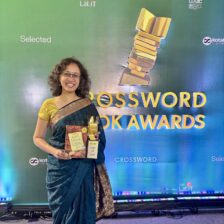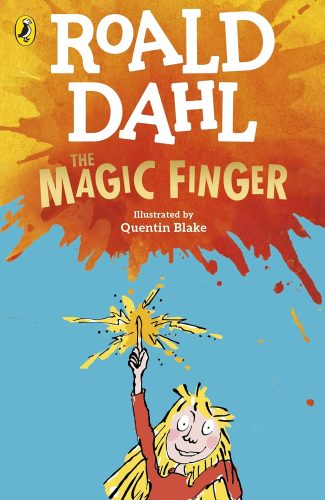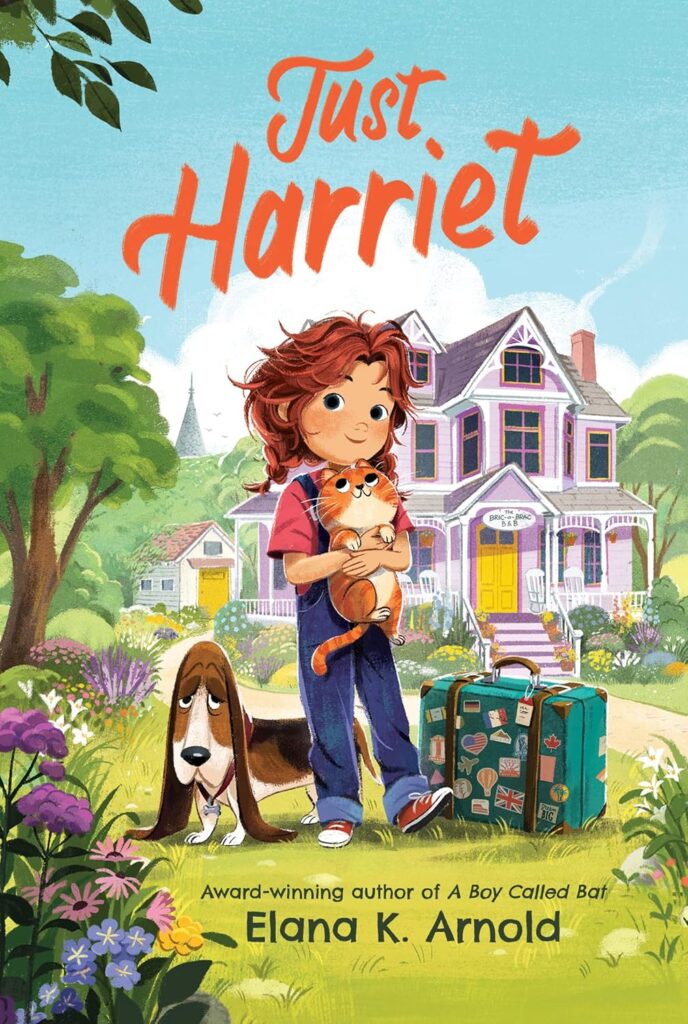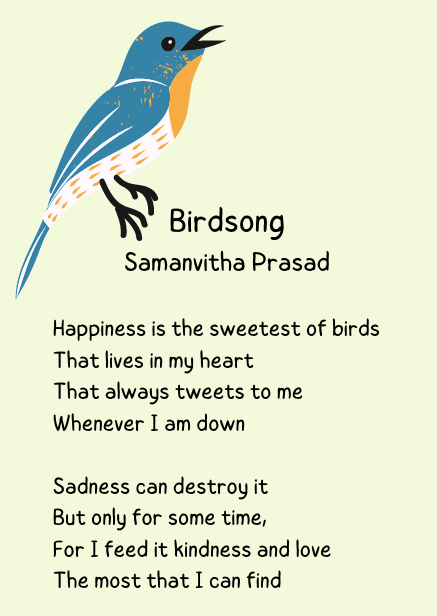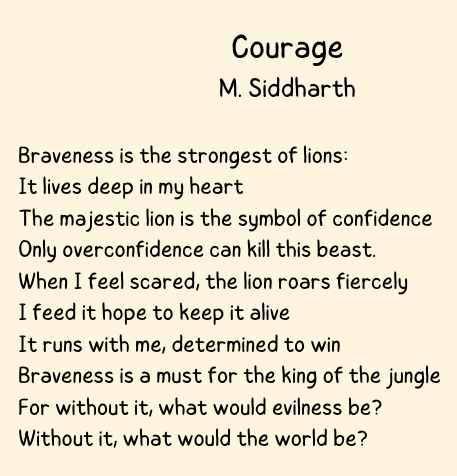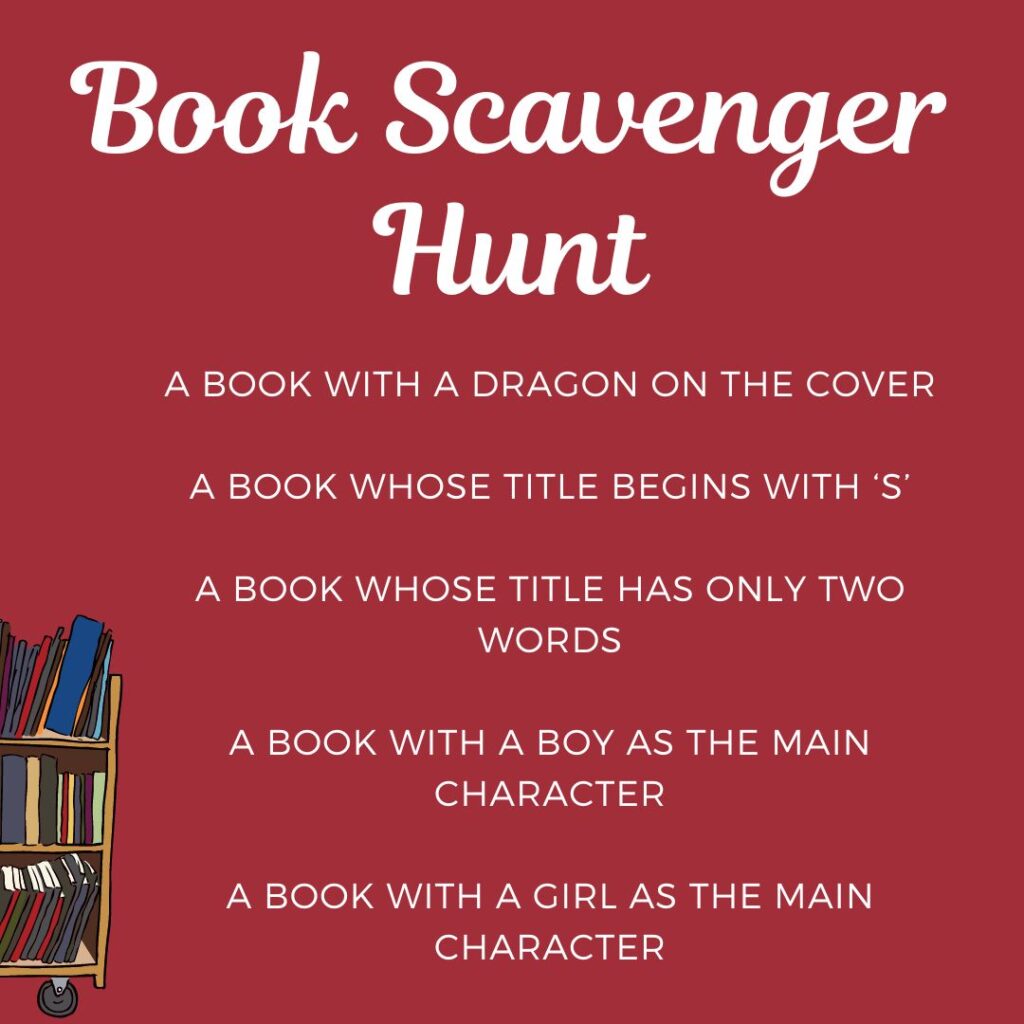The Magic Finger
November 5, 2024
I typically shy away from very well-known books at my book club because I feel that children will come across these books through schools and bookshops anyway. But I’ve always loved Roald Dahl’s work, and what is a book club for if not to spark the joy of reading? We’ve read Fantastic Mr Fox and Esio Trot. Next month, we’ll read The Magic Finger!
Anger
While all of us might wish we had a magic finger to zap someone who makes us angry, that isn’t practical, is it? What do you do when you’re angry? What makes you angry?
Superpowers
Discussing superpowers is a great way to get creative. What superpowers would you like to have? What would you do with those superpowers?
Taking this further, what superpowers would you need to solve specific problems that we see around us?
Book Review
With my book club for ages seven and eight, I often find that the children don’t always understand the details enough to form an opinion about the books we read. It’s for this reason that we often have book discussions, talking about what we like and don’t like about the book. This time, we’ll take this further with brief, simple book reviews that explore our understanding of character and story.
Join a book club!
There’s no better way to fall in love with reading than to start young!
Registrations are now closed for the December 2024 -January 2025 edition of my book club. New batches begin every alternate month. Join my mailing list if you would like to receive email notifications about my programmes. Alternatively, follow me on social media – Facebook and Instagram – for regular updates.

Leonora Bolt: Secret Inventor
November 4, 2024
I borrowed Leonora Bolt: The Great Gadget Games from a library recently, and my first thought was that the series would be perfect for my book club!
A science-loving protagonist with imaginative, innovative ideas, a secret inventor, an unusual set of friends … it’s full of possibilities! And that’s why we’re going to be reading the first book from the series, Leonora Bolt: Secret Inventor at my book club next month.

Friendship
Leonora Bolt’s friends include an otter, a cook, a sea captain and a boy who washes up on the island. This will be our prompt to write about an unusual friendship we’d love to have. If you could befriend anyone, whom would you befriend and why? How do you think you could help each other?
Inventions
If you are on an island in the middle of nowhere, but you were the smartest person in the world, what would you invent? How would your invention work?
I love working with wacky inventions of all kinds. I have a poem that plays with innovation and invention too, Making a Clone, though the characters in the story aren’t nearly as successful as Leonora Bolt!
Picture Prompts
Picture prompts are a great way to get started on a story of your own, and The Thinking Collection has a couple of inspiring images of machines. We’ll use these, in addition to a few verbal prompts, to write a story of our own.
Join a book club!
Read, Write, Explore is an ongoing programme that combines the joy of a book club with an introduction to creative writing. There are twelve classes in each edition of the programme, and three of these classes are devoted to writing. Additionally, we play vocabulary games, draw a little, discuss characters and stories, and much more.
Registrations are now closed for the December 2024 -January 2025 edition of Read, Write, Explore. New batches begin every alternate month. Join my mailing list if you would like to receive email notifications about my programmes. Alternatively, follow me on social media – Facebook and Instagram – for regular updates.
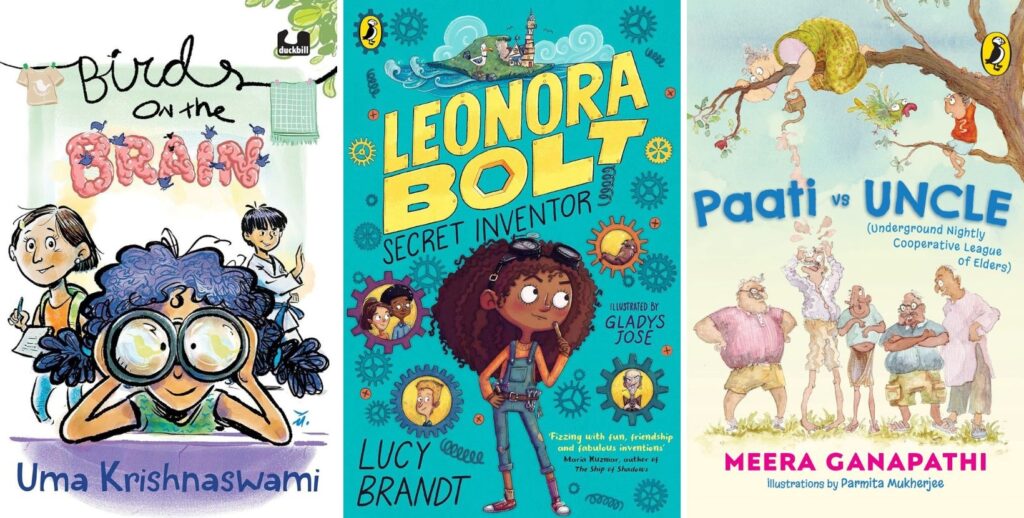
Bookasura
November 3, 2024
Some books demand to be read at reading programmes. Lucky Girl, with its exploration of poetry. Chitti’s Travelling Book Box with its message of spreading the love for reading. Book Uncle and Me, with the need to save a lending library.
And Bookasura, with its book-eating asura. And that’s why we’re rereading this one at my book club!
Bala loves books. He devours them. Not literally, of course. The problem, however, is his baby sister Meera, who actually likes to eat books. When Bala meets Bookasura, a book-eating demon, he sees a strong resemblance between Meera and the asura. What can he do to defeat Bookasura? What weapon does he have to destroy this book-loving monster?
Bookasura is a fun, funny book about a boy fighting a villain who is bigger and stronger. He uses the skills he has – his stories and his wit. Imaginative and thrilling, I know this is the perfect book to read next with my book club!
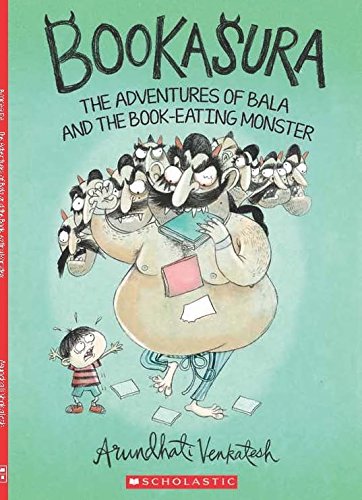
Name the Asura!
Raghu Thatha tells Bala the story of Bakasura. Is that what makes Bookasura enter Bala’s life? Maybe. Maybe not.
But naming an asura can be fun! What other asuras can you come up with? What terrible things do they do?
Out in Nature
Being outdoors is precious. Bala spends time on a farm, throwing stones at mangoes, looking at jackfruits and lemons, and making a compost heap.
I would like the children to step out of the house, pick up something from nature and talk about it. How does it look? How does it smell? Does it make a sound?
This could be a leaf, a twig, a pebble – anything!
Books
We’ll play a little book game together, just like Bala from Bookasura. Book scavenger hunts are always fun!
Join a book club!
Registrations are now closed for the December 2024 -January 2025 edition of my book club. New batches begin every alternate month. Join my mailing list if you would like to receive email notifications about my programmes. Alternatively, follow me on social media – Facebook and Instagram – for regular updates.

Birds on the Brain
November 2, 2024
Uma Krishnaswami’s Birds on the Brain is such a lovely book! I’ve read Book Uncle and Me with my book club, and I just revisited the post I wrote about it. Three years ago, I wrote about having discovered verse novels “quite recently” and now I have two verse novels of my own!
In Birds on the Brain, we meet lots of familiar characters, and although I love verse novels, I enjoyed this book more than the first. The characters, particularly the protagonist Reeni, are wonderfully relatable. Reeni, for instance, is a balance of self-centred and selfless. She has birds on her brain and it takes her a while to notice that not everyone is motivated by the same things. Yet, she makes an effort. She doesn’t want to lose her friend Anil and she does want to help the istri lady. But how?
This endearing story shows us just how she can catch two birds with one phone, to use her words, much kinder than killing two birds with one stone!
Discovering overlapping themes in modern kidlit is delightful too–just like in Petu Pumpkin: Freedom Fighter and Dhara’s Revolution, Reeni bemoans the fact that children don’t have power!
A warning, though: like I wrote when I reviewed Pax, Journey Home, however, I would suggest you don’t read the blurb. Again, something in the blurb happens very late in the story!
Here’s what we’ll do as we read Birds on the Brain at my book club.
Hobbies and Interests
As Birds on the Brain is the first book we will read next month, it will be the perfect prompt to talk about what interest us. Anil loves karate. Yasmin loves books. Reeni loves birds. What about my book clubbers? What interests them, what are they curious about, and what hobbies do they have?
Birds
I will never tire of asking children to talk about their favourite birds! With The Paradise Flycatcher, The Golden Eagle, Talon the Falcon, A Flamingo in my Garden, Ostrich Girl … I’ve learned about so many birds!
Each time I do this activity, however, I gently nudge children to look at birds outside their window instead of talking about birds they’ve never seen. Perhaps the sunbird in the story will be another push in that direction!
Writing a Report
Surveys are fun! Just like Reeni and Yasmin, I will ask the children to think of a topic and conduct a survey of their own. What interests them? What would they like to find out about? What surprising results do their surveys have? I’d love to know!
The linked writing activity will be for them to compile their data and present it in a meaningful way. We’ll work on structure and form to write a report based on the surveys we conduct.
Join a book club!
Registrations are now closed for the December 2024 -January 2025 edition of Read, Write, Explore. New batches begin every alternate month. Join my mailing list if you would like to receive email notifications about my programmes. Alternatively, follow me on social media – Facebook and Instagram – for regular updates.

The Great Escape
November 1, 2024
Each time Menaka Raman posted about The Great Escape events, she urged participants to bring a spoon.
And then, when she autographed my copy, she wrote Spoontacular Varsha.
How could I not be intrigued? What’s the big deal about a spoon anyway?
You have to read The Great Escape to find out, and that’s why it’s the first book we’ll be reading at my book club in December.
Sachit wants to escape from school. And the best thing about finding a friend is that you can lay devious plans together, and do your best not to get caught as you execute those plans. A fun, mad read, I think the best part of the book is the way it ends, but I’m not going to give that away!
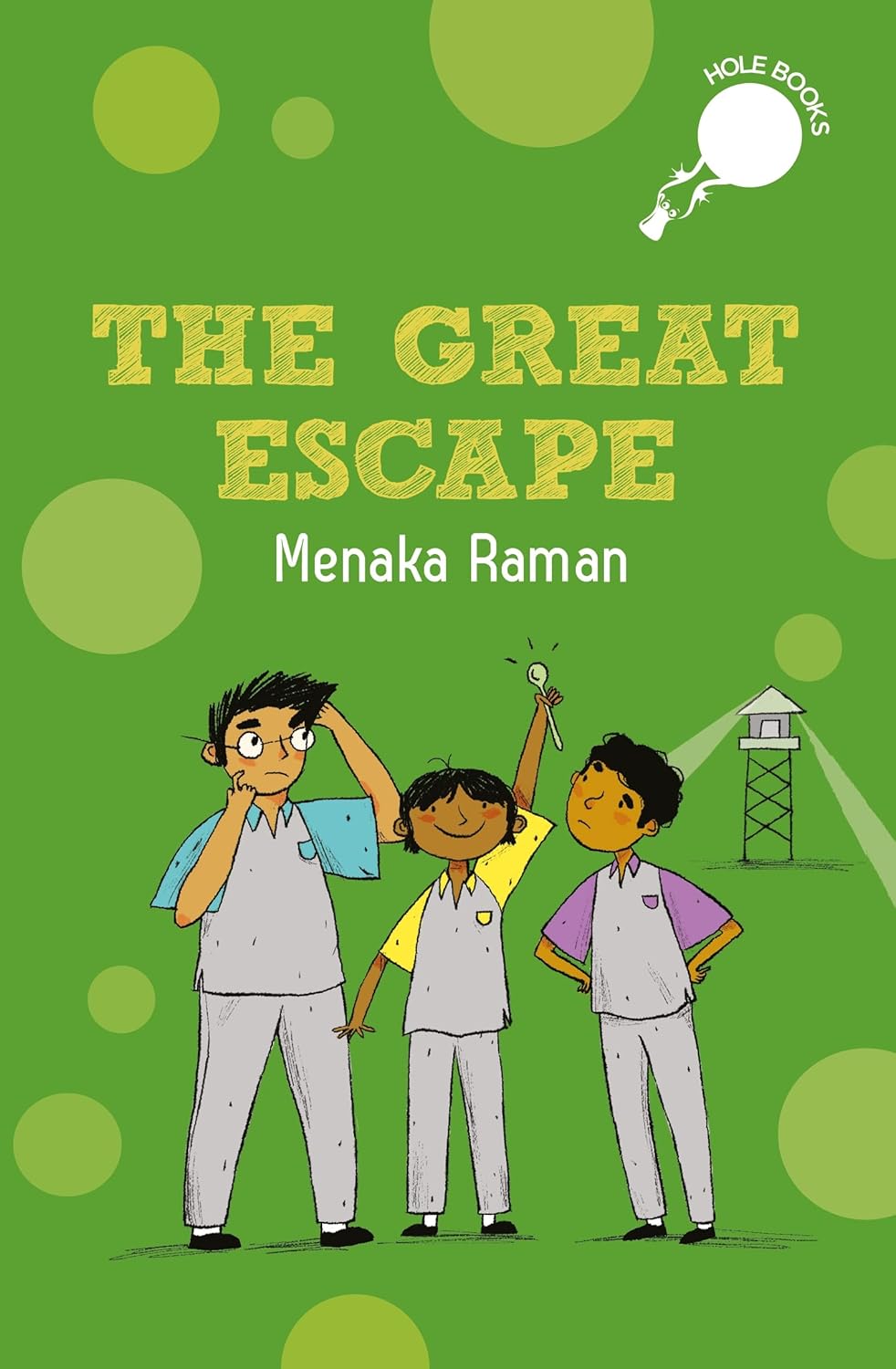
Spoons
We’ll do our spoon activity before we start reading The Great Escape. What I used to find (and perhaps still find) most exciting about a spoon is that you’re upside-down in there! And turning the spoon upside-down doesn’t help. What else can you do with a spoon, apart from turning yourself upside down? I’m waiting to find out.
New Places
One of the reasons Sachit wants to escape is that he is in a new school. New places are often frightening, especially until you find a friend. I’d love for the children to talk about their experiences with a new place. What do they do? How do they make friends? Are they afraid?
The Great Escape
A book called The Great Escape is perfect to explore escape games! I love treasure hunts and clues. We’ll imagine an escape room and I’ll give the children a set of clues they have to solve in order to escape!
Join my book club!
Registrations are now closed for the December 2024 -January 2025 edition of my book club. New batches begin every alternate month. Join my mailing list if you would like to receive email notifications about my programmes. Alternatively, follow me on social media – Facebook and Instagram – for regular updates.

Illustrating Picture Books with Ashok Rajagopalan
October 22, 2024
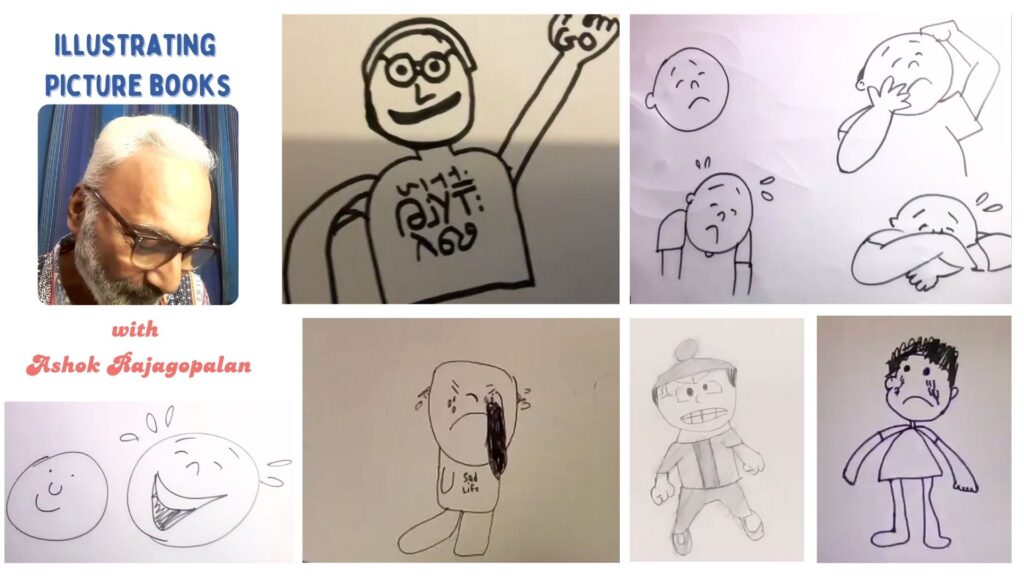
What an enriching session we had on illustrating picture books with Ashok Rajagopalan!
“I didn’t know this, but I make an angry face when I’m drawing an angry face!” Ashok said. “If I want to draw a sad face, I make a sad face myself.” I remember seeing something about Disney doing the same thing. Is it something all artists do?
Today’s focus was creating emotions in picture books. Among the most interesting things for me was the fact that the reader’s emotion can be quite different from what the character is feeling. Sometimes, a character is angry, or confused, but the reader laughs. This laughter is deliberate, and the illustrator must portray the character’s emotion in such a way that the reader feels compelled to laugh.
Using a series of drawing exercises, we worked on drawing emotion and then heightening these emotions, first through the face itself and then through body language, colours and setting. As with every art workshop I’ve organised, I’m amazed at how easily and quickly illustrators draw! Look at the top right illustration in the image above for instance. Isn’t it incredible? It was done in less than a minute!
The Best Idea of All
September 7, 2024
I’m always nervous about reading my books with my book club! I wonder if and when I’ll get over that. We’ve read Dragonflies, Jigsaws and Seashells, The Prophecy of Rasphora, Dhara’s Revolution and Flipped, and now, we’ll read The Best Idea of All.
A story about festivals and the climate crisis, The Best Idea of All explores how children can and do find ways to make a difference.
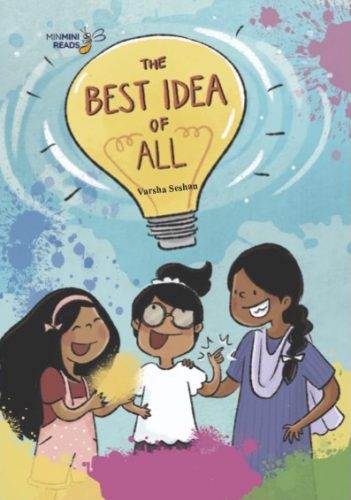
As I discovered through the many author events I did with The Best Idea of All, there’s so much I can do with the book! And especially as my book club runs online, we can bring in elements that would be rather difficult to do at an in-person session – like making natural colours.
Book Discussion
What is the climate crisis? And what can we do about it? The cover of The Best Idea of All reveals what festival the story is about – Holi. But in the middle of the worst drought the state has experienced in decades, how can Tarini, Antara and Saira celebrate Holi?
We’ll talk about what has caused the climate crisis and whether we as individuals can do something about it.
Saving Water
At my book club, we read each book over the course of three classes. At the beginning of each class, we’ll talk about what we do to save water. And at the end of the second session, we’ll share a whiteboard to create a virtual chart on water and what it means to us.
Making Natural Colours
Online sessions are perfect for art integration of this kind! Water shortage is just one problem when it comes to playing Holi. The second is the use of chemical colours that harm the environment. Together, we’ll explore how we don’t need chemical colours at all because making natural colours is both fun and easy!
Parents and teachers often ask me how to get children to read. While there’s no foolproof method, here are three suggestions I always give them:
- catch them young
- read exciting books (and not just the classics)
- make reading fun
I know I’m biased, but a book club is a great way to bring these three together. But equally, a book club is for children who already enjoy reading. Reading can be isolating, but a book club brings the excitement back with all the activities we do and conversations we have.
Join my book club!
Registrations are now closed for the November-December 2024 edition of my book club. New batches begin every alternate month. Join my mailing list if you would like to receive email notifications about my programmes. Alternatively, follow me on social media – Facebook and Instagram – for regular updates.

Dungeon Tales II
September 6, 2024
We’re going to reread Dungeon Tales II by Venita Coelho at my book club! And thanks to the Neev Literature Festival, I have an autographed copy!
Short stories work well with my book clubs, especially as we read just excerpts in class. Both volumes of Dungeon Tales were wonderfully received by the children, so I’m excited to read three more stories from this volume!
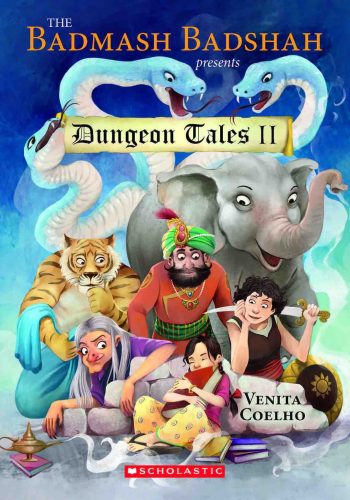
Roman Numerals
I loved Roman numerals as a child, and I always waited for the chance to use them. Letters that are actually numbers? Fascinating!
We’ll look at numbers, why the introduction of zero was important, and see how difficult it is to add XCIV and VI, for instance, while 94 + 6 is as easy as it gets!
Structure
Stories within a story within a story – I love the idea! What unique structures have writers played with? Is it possible for us to write a story using chat messages? Let’s find out!
Alliteration
How can I read a story about the Badmash Badshah and not encourage the children to play with alliteration? Huge Horribleness, Rudimentary Rottenness, Wonderful Wickedness … What else?
Join my book club!
Registrations are now closed for the November-December 2024 edition of my book club. New batches begin every alternate month. Join my mailing list if you would like to receive email notifications about my programmes. Alternatively, follow me on social media – Facebook and Instagram – for regular updates.
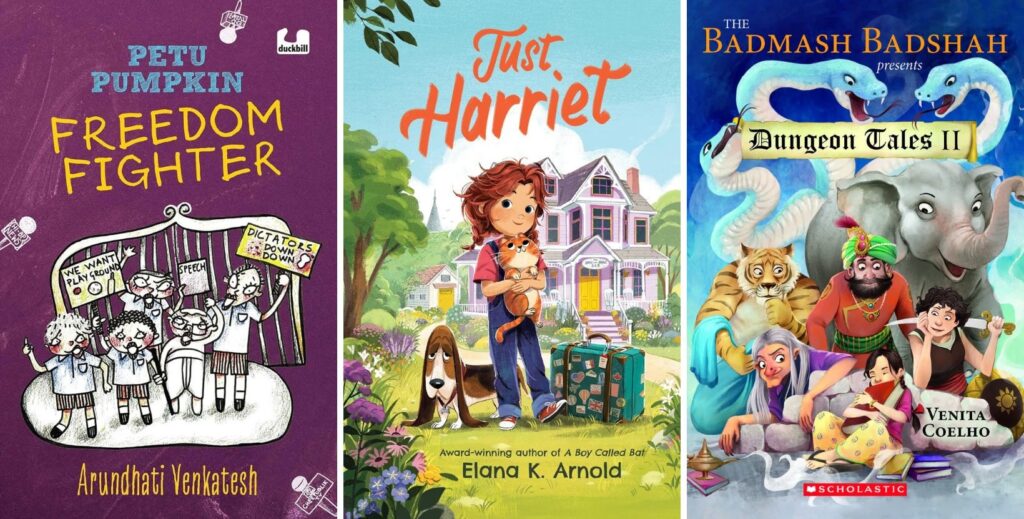
The Talking T-Rex
September 5, 2024
We’ve read two books from the A to Z Mysteries by Ron Roy; we’re all set to read another!
Before picking up The Talking T-Rex, I wondered whether it would be a scary book–that’s what the cover leads us to believe. But it’s not! We know from the very beginning that the T-rex is a machine; in fact, we first see it before it is assembled. The mystery revolves around the T-rex, yes, but it’s about who stole money from the T-rex’s belly. It isn’t about a T-rex going rogue! And the simplicity of the story makes it a perfect book club read.
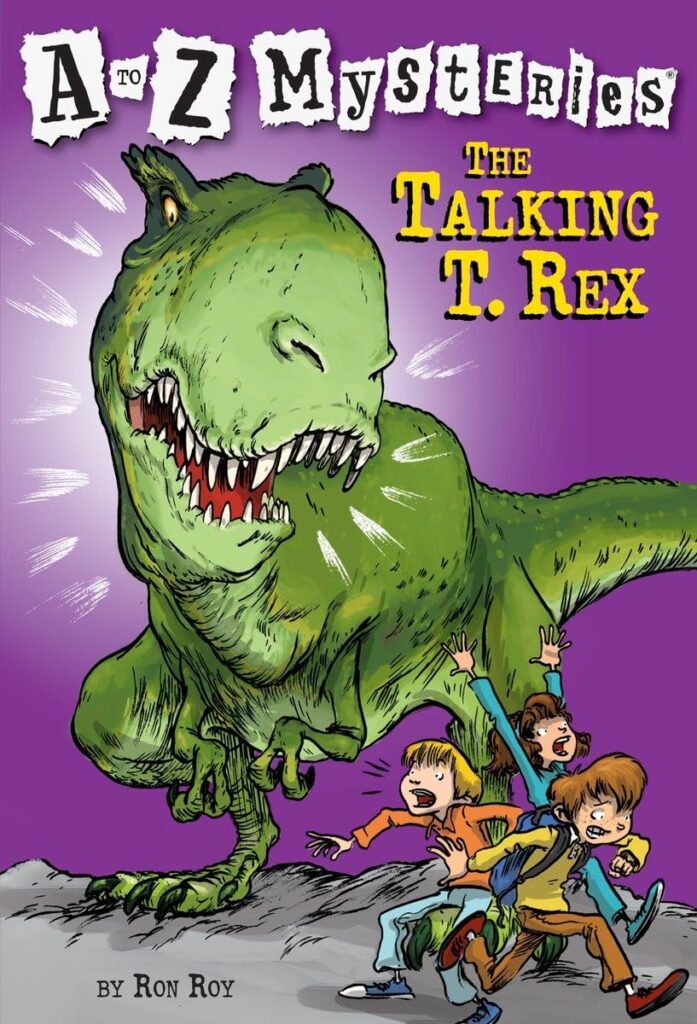
Inventions
A talking t-rex is an exciting invention! If you could invent anything at all, what would you create and why? How would it work?
Alliteration
‘Alliteration’ is a word that I introduce to my book club over and over again because it’s such fun to play with! The Talking T-Rex. The Canary Caper. And at my book club, so many more!
We’ll do a book scavenger hunt of alliterative titles and then try to invent a few alliterative titles of our own based on picture prompts that I share.
Picture Prompt
Using a picture prompt of a very interesting machine, we’ll work on a series of questions. What does the machine do? Who invented it? This is a lovely imaginative exercise!
I love introducing book series to my book club! I remember when we read The Absent Author. Two weeks later, one of my book clubbers told me she’d bought a few more and borrowed the rest from a library. There’s nothing like a series to keep children reading!
Join a programme
Registrations are now closed for the November-December 2024 edition of my book club. New batches begin every alternate month. Join my mailing list if you would like to receive email notifications about my programmes. Alternatively, follow me on social media – Facebook and Instagram – for regular updates.

Just Harriet
September 4, 2024
Harriet isn’t your typical protagonist. She lies, she’s selfish, and she’s often sulky and bad-tempered. Even as I read Just Harriet, I mulled over whether to introduce it to my book club. We’ve read and loved two books by Elana K. Arnold – A Boy Called Bat and Bat and the End of Everything – but this one’s quite different. The protagonist is younger; she’s just finished third grade. More, she behaves a lot younger; she’s not the sophisticated child we often see around us. But doesn’t that make her more real?
The answer, to my mind, was yes. And that’s why we’re reading Just Harriet at my book club for ages nine at ten next month.
Names
Harriet is named after the protagonist of Harriet the Spy, but whenever grown-ups make the link, she’s quick to say that she’s “just Harriet”. Names are important to all of us! What does your name mean? Who named you? What do you like about your name? I’d love to know!
Point of View
What if the whole story were told from a different point of view? The dog Moneypenny and the cat Matzo Ball would look at the whole summer quite differently, and it’ll be fun to explore an animal’s point of view, either in the form of poetry or diary entries!
Treasure Hunt
Harriet is sent to live with her Nanu on Marble Island. She’s determined to hate it there, but when she discovers a mysterious key, she knows she must go on a treasure hunt!
Writing about treasure is exciting. I’ve written several stories, in fact, about hunting for treasure, two of which were published in Dragonflies, Jigsaws and Seashells. During the creative writing component of Just Harriet, we’ll explore how we can create anticipation and suspense as we write a quest story.
Join my book club!
Registrations are now closed for the November-December 2024 edition of my book club. New batches begin every alternate month. Join my mailing list if you would like to receive email notifications about my programmes. Alternatively, follow me on social media – Facebook and Instagram – for regular updates.

Spellbound
September 3, 2024
We’re rereading Spellbound by Nalini Sorensen at my book club next month!
There are some books that simply must be read at a book club. They’re full of possibility, bursting with ideas and imagination.
When author Nalini Sorensen visited my online creative writing programme a few months ago, Spellbound was hot off the press, and the reviews I read promised that it would be be one of those books, a delight to work with. And I wasn’t wrong. It is everything I expected it to be – a book that wants to be read and discussed.
In Nalini Sorensen’s story, all poor Prince Freddy was doing was chasing a beautiful butterfly. That’s it. It was sheer bad luck that he ran into the witch Weyona, who took great delight in turning him into a frog. Yes, that’s a little bit of The Frog Prince right there; it is a fairytale remix after all. But what will saving Prince Freddy involve? Is he going to get a good fairytalesque happily ever after?
Spellbound is a delightful exploration of alternatives and possibilities, providing me with all kinds of ideas to use at my reading programme.
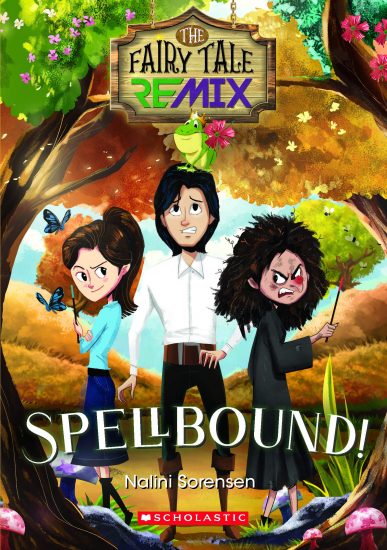
Perspective
I’ve always love working with fairytales at workshops. Whether we work with changing the setting or swapping gender roles, fairytales form the basis of many activities. At my creative writing programme, for instance, children rewrote stories by exploring new perspectives and alternative endings. Sure, the children were older, but it is never too early to look at someone else’s point of view, is it?
What if Cinderella were narrated by the stepmother? Would the story change?
What if the sleeping beauty did not want to marry the very first man she saw?
‘What if’ makes for the most imaginative activities, and I can’t wait to read Spellbound with a bunch of seven and eight-year-olds!
Imagination
When I read the book, I began to think. How would a magic store like Magitrix would look? And Helda at the store? How would she look?
Zubringer Ribbit!
Zubringer Reversita Ribbit!
What do these magic words do, and what new words can we come up with? I’m sure I will soon find out.
Oral Stories
The first step towards creative writing is storytelling, and I love working with adding one sentence at a time in a story circle. With young children, I sometimes contribute every alternate sentence so that something happens continually, instead of the story meandering aimlessly. A fairytale remix promises to be hilarious. What will happen if we bring Cinderella, Rumpelstiltskin, Rapunzel and Snow White into the same story? Together, we’ll figure it out.
Why do we reread books when there are so many others available? For several reasons, but the most important one is that if the children at my book club love a book we read, I keep it in mind and reintroduce it to a fresh batch after a couple of years. A child-approved book is the best kind to read at a book club for children!
Join a programme
Registrations are now closed for the November-December 2024 edition of my book club. New batches begin every alternate month. Join my mailing list if you would like to receive email notifications about my programmes. Alternatively, follow me on social media – Facebook and Instagram – for regular updates.

Petu Pumpkin: Freedom Fighter
September 2, 2024
We need more books this length! Petu Pumpkin: Freedom Fighter is perfect for my book club for so many reasons! For one, it’s a book about agency and creating change, while also being a humorous read featuring familiar characters. For another, since it’s just about a hundred pages long, we have enough time to read as well as do activities based on the book.
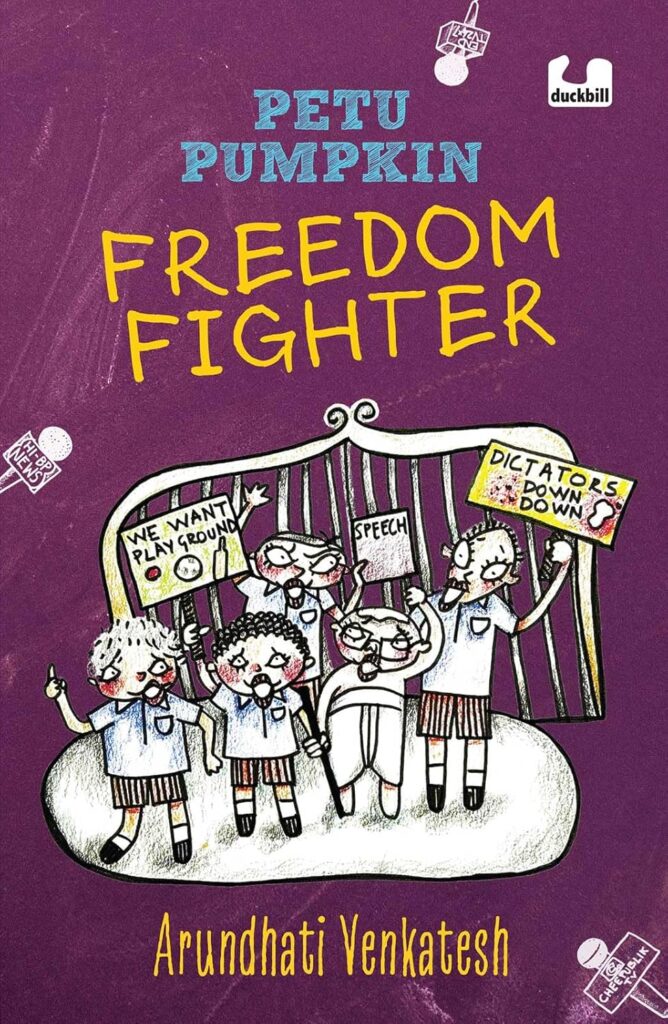
Interviews
Petu Pumpkin and his friends gather quite a crowd as they protest outside their school gates. This is a good prompt for us to explore how interviews worked. What questions would we ask an interviewee? Just like when we read Sita’s Chitwan, I look forward to interesting interviews of my book clubbers!
Campaign
What would you campaign for? What makes you angry, and what do you feel is unjust?
With Petu Pumpkin, we’ll look at a few elements of a campaign from discussing what changes we want to make to the world around us to designing a poster.
Writing a Speech
What goes into a speech? How do we structure it so that it is impactful. As we read about speeches, we’ll try to write one of our own about something we believe.
Join my book club!
Registrations are now closed for the November-December 2024 edition of my book club. New batches begin every alternate month. Join my mailing list if you would like to receive email notifications about my programmes. Alternatively, follow me on social media – Facebook and Instagram – for regular updates.

We’ve read and enjoyed four of Arundhati Venkatesh’s books at my book club! Take a look:
Susie Will Not Speak
September 1, 2024
Susie Will Not Speak by Shruthi Rao was one of the first hOle books I read, and it remains one of my favourites. Jahan and Susie leap out of the pages – sparkling characters that make the story what it is.
Susie has a lisp. How can she say even her own name without proclaiming her lisp to the world? There’s just one solution. Susie will not speak. Ever. What can her best friend Jahan do?

NOT Speaking
What if you refuse to speak? How else can you communicate?
We can use the chat box, charades, artwork, and even make up a sign language of our own. During our very first class, that’s exactly what we’ll do!
Poems
Bullies make up mean rhymes about Susie, but those rhymes don’t even make sense. Surely, we can do better! We’ll try to make up rhymes about ourselves – and they’ll make sense too!
Tongue Twisters
A noise annoys an oyster.
She sells seashells on the seashore.
Susie may not agree, but playing with tongue twisters is fun! How many other tongue twisters do we know? And how fast can we say them?
The earlier children develop the habit of reading, the more likely they are to continue to be readers. And a book club is a great way to foster a love for books!
Join my book club!
Registrations are now closed for the November-December 2024 edition of my book club. New batches begin every alternate month. Join my mailing list if you would like to receive email notifications about my programmes. Alternatively, follow me on social media – Facebook and Instagram – for regular updates.

Mini’s Books
July 7, 2024
Books about books are always a joy to read at my book club! We’re reading In the Woof of Time at my reading programme for ages nine and ten and Mini’s Books at the one for ages seven and eight.
Anyone who grew up on Enid Blyton wanted to eat scones, crumpets and treacle. I was one of them, and so, this book is all the more believable. Mini wants to eat the food the Big Little Monsters in the books she reads eat. And through her summer holidays, she slowly learns more and more about these monsters–and discovers all the surprising consequences of reading books! Thanks to her stories, she makes a friend, becomes a detective, learns to entertain herself and even starts to cook!

Monster Stories
I love monster stories! The wonderful thing about monsters is that they can take any form whatsoever. They can be tiny or huge, friendly or ferocious. Together, we’ll create a monster of our own!
Recipes
What are Tooth Crunchers, Bone Crackers and Round-Rounds? Let’s use our imagination and write recipes for each of these. Will we find them as much fun as the Big Little Monsters in Mini’s Books?
Colour the Story
Just like when we read Lucky, It’s Summer!, we’ll spend some time colouring the pictures in the story. Colouring monsters will be particularly enjoyable!
Join my book club!
Registrations are now closed for the August-September 2024 edition of my book club. New batches begin every alternate month. Join my mailing list if you would like to receive email notifications about my programmes. Alternatively, follow me on social media – Facebook and Instagram – for regular updates.

In the Woof of Time
July 6, 2024
A book club mystery – of course I had to explore the possibility of introducing it to my book club!
Samar and his friends find themselves in the middle of a spate of thefts – a dog, milk bottles, and even jewellery. They love reading mystery stories, so this they must investigate the mystery that surrounds them! Will they do it in the woof of time?
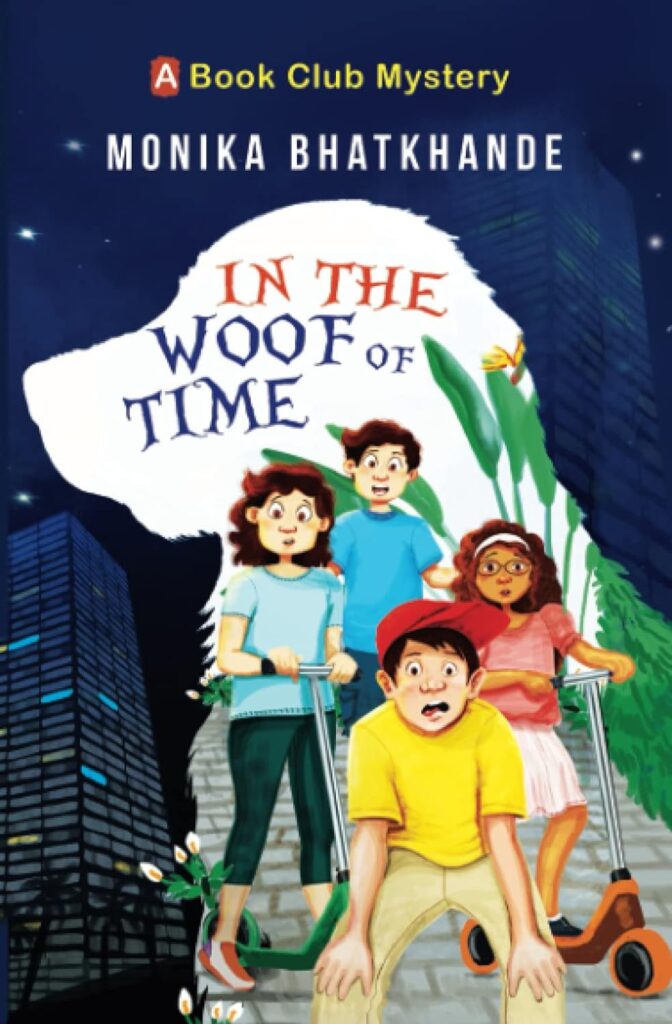
Clues and Puzzles
As we read In the Woof of Time, we’ll engage in a little code-making and code-breaking of our own. Detective stories and cryptograms go together!
Alibis and Red Herrings
A lot of words and phrases are associated with detective stories alone. As we read In the Woof of Time, we’ll do a vocabulary quiz, testing how many of these words are familiar to us.
Creating a Detective
Sherlock Holmes, Hercule Poirot, Miss Marple, the Five Find-Outers and Dog … So often, iconic detectives propel mystery stories. Together, we will attempt to create a group of detectives. What would this group call itself? What are the characters’ strengths and weaknesses? Is there one character who is smarter or more courageous than the rest?
Join a book club!
The August 2024 edition of Read, Write, Explore is sold out!
New batches begin every alternate month. Join my mailing list if you would like to receive email notifications about my programmes. Alternatively, follow me on social media – Facebook and Instagram – for regular updates.

The Perfect Present
July 5, 2024
We’ve read two books from the Ready, Freddy series at my book club, and I’m happy to read another! While I cannot say I love the books, I see how well they suit a book club. They are easy to read, full of illustrations, and great conversation starters.
The Perfect Present is a Christmas story. Freddy is making a list of everything he wants for Christmas. His list is endless, but predictably, the story leads us towards an understanding of the spirit of Christmas.
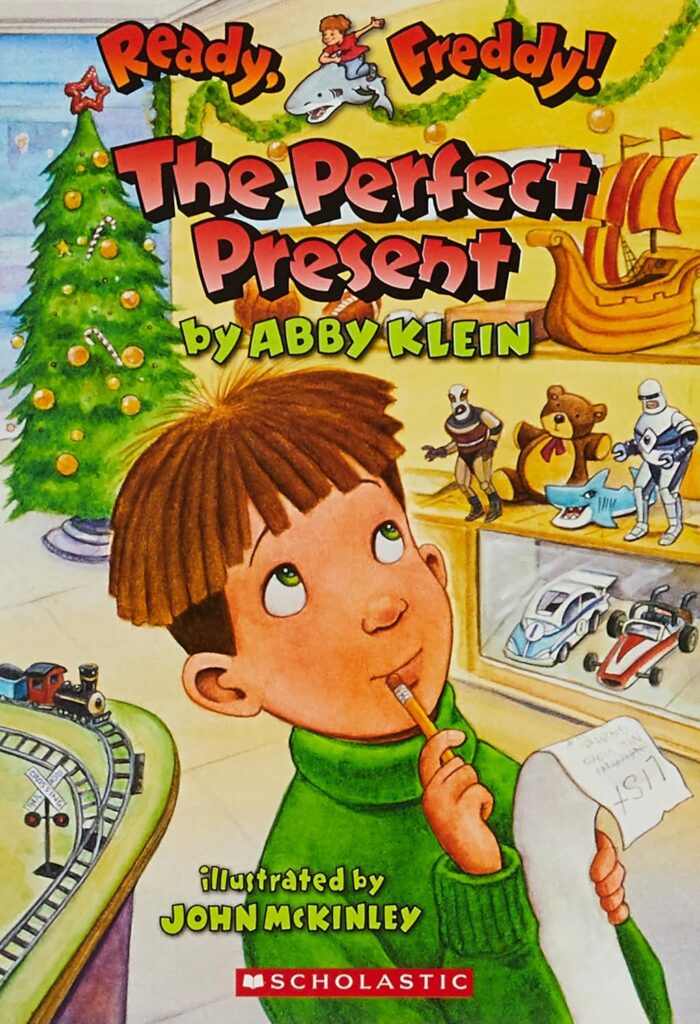
Book Activities
The Ready, Freddy series is full of readymade activities – finding the hidden fin in each picture, a word puzzle, and a craft activity too!
Festivals
I remember a book club session some time ago when a child told us all about Onam! A book about Christmas will be the prompt for the children to talk about their favourite festivals–which ones they celebrate, which ones are special and what makes them special.
Lists
Freddy and Suzie make lists of things they want for Christmas, but we’ll make other lists. What are our favourite toys? Favourite people? What about the five most boring things in the world? I’m sure we’ll have fun!
Join my book club!
Registrations are now closed for the August-September 2024 edition of my book club. New batches begin every alternate month. Join my mailing list if you would like to receive email notifications about my programmes. Alternatively, follow me on social media – Facebook and Instagram – for regular updates.
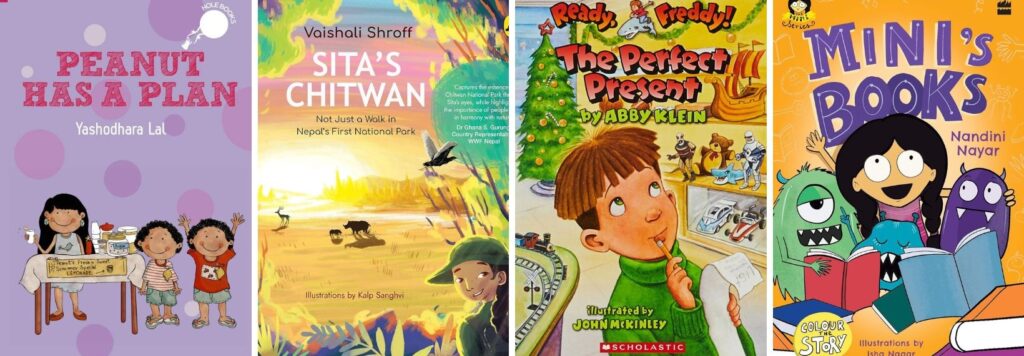
The Worst Witch to the Rescue
July 4, 2024
I used to read The Worst Witch as a child! I had no idea whether I would still enjoy reading about the hapless Mildred Hubble, though. I picked up The Worst Witch to the Rescue without having decided whether to introduce it to my book club–and I loved it all over again! It’s funny, sweet and full of action; I’m sure my book clubbers will enjoy the book too.
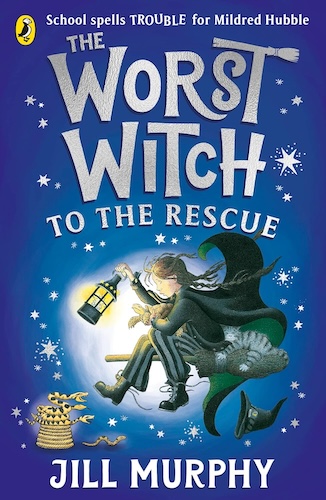
Quizzes and Vocabulary Games
Most children love fantasy. I look forward to doing a few magical games with them – a word search puzzle on words related to magic, a quiz about famous magical places, and perhaps an activity on creating a witch together too!
The Rule of Three
It’s never too early to get children to start looking at how books are structured. The rule of three, for instance, is a fascinating one. How many characters come together at the centre of the story? What other interesting threes can we find as we read?
Magical Adventures
Spells going wrong make for funny, exciting stories, so this will be our prompt for the creative writing component for The Worst Witch to the Rescue. What spell would you like to create? If it goes wrong, what will happen? And how will your protagonist deal with the consequences?
Join a book club!
The August 2024 edition of Read, Write, Explore is sold out!
New batches begin every alternate month. Join my mailing list if you would like to receive email notifications about my programmes. Alternatively, follow me on social media – Facebook and Instagram – for regular updates.

Sita’s Chitwan
July 3, 2024
Last year, I invited Vaishali Shroff to conduct a workshop for my writing programme on nonfiction. It was aptly called ‘Non-Boring Nonfiction‘. I rarely read nonfiction, and I don’t think I’ve ever read nonfiction with my book club. I find it easier to introduce nonfiction elements through books like A Cello on the Wall and A Giant Leap.
Once more, that is what I will be doing with Sita’s Chitwan. Half the book is a story, the story of eight-year-old Sita, who lives on the outskirts of Chitwan National Park. The other half of the book lets us explore Chitwan National Park, introducing us to its vegetation, people, animals and birds. I’m waiting to read this book with my book clubbers next month!
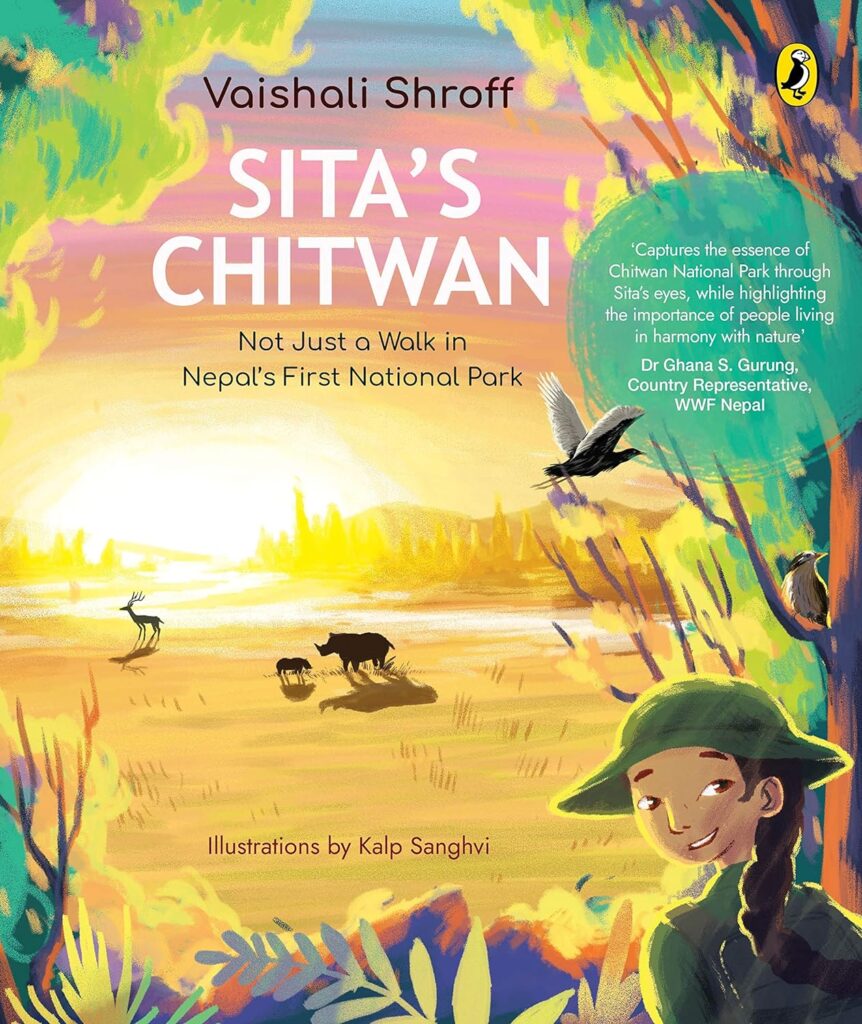
Paw Prints
Often, when we visit the jungle, guides tell us that the job of a guide is much like the job of a detective. Following tracks, looking for clues … it’s exciting! In class, we’ll do a little activity matching animals with their paw prints. Let’s see how many we can identify!
Sense Poems
Can we link our emotions to our five senses? This is an activity I’ve done before, like when we read The Vampire Boy, for instance. A book that is set in the great outdoors is perfect for exploring our senses. We’ll watch a quick video of the jungle and then explore what emotions we feel. We’ll then take the next step and link these emotions to our senses.
Interviews
Towards the end of Sita’s Chitwan is an interview of Doma Paudel, the first female nature guide in Chitwan. This will lead us to interviews of our own. I will give my book clubbers five questions that I want them to ask someone in their family. They’ll record their interviews and share them in class!
Join my book club!
Registrations are now closed for the August-September 2024 edition of my book club. New batches begin every alternate month. Join my mailing list if you would like to receive email notifications about my programmes. Alternatively, follow me on social media – Facebook and Instagram – for regular updates.

Flyaway Boy
July 2, 2024
We’re going to read Flyaway Boy again at my book club! We’ve read and enjoyed When the World Went Dark by Jane de Suza twice, and I look forward to reading this one with another batch too. It’s perfect to discuss so many things – form, narrative voice, imagination, possibility … The list of ideas below just about scratches the surface of everything we can do with the book!
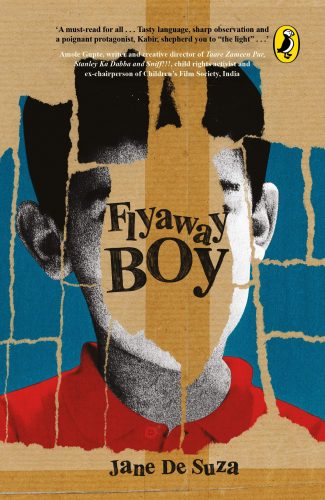
Boxes
Flyaway Boy opens with a bit about boxes. What neat little boxes do we fit into? Are there any labels we give ourselves, or any labels people give us? Especially as many of the children join my book club batch after batch, I’d love to know if there are any labels they give one another. What labels do they associate with the others at the book club?
It’s an interesting introspective activity to undertake even without the context of the book because sometimes, we create labels for ourselves and try to live up to them, even if we’ve actually outgrown the boxes to which those labels belong.
What do you make up?
Continuing with the idea of introspection, I would love for the children to write a little about what they make up. We make up stories all the time. Stories about being rich and famous. Stories about being top players, top students, anything. This is likely to be something private, and I won’t push the children to share what they’ve written, but journalling our ideas is always an eye-opener.
Collective Nouns
What collective nouns do we know? Nana Know-It-All makes up a poem featuring a murder of crows, a gulp of swallows, a kettle of hawks and a shrewdness of apes. Together, we’ll do a fun, funny activity that introduces odd collective nouns.
Join a book club!
The August 2024 edition of Read, Write, Explore is sold out!
New batches begin every alternate month. Join my mailing list if you would like to receive email notifications about my programmes. Alternatively, follow me on social media – Facebook and Instagram – for regular updates.

Peanut Has a Plan
July 1, 2024
We read Peanut Vs the Piano over two years ago at my book club, and it was such fun! I wrote a blog post about one of the activities we did as we read the book, and I look forward to repeating the activity with a fresh batch of book clubbers as we read Peanut Has a Plan.
This hOle book is a lovely little chapter book about determination and kindness. With an enterprising character at the centre of the story, what starts off as a desire to earn money becomes much more than that. Peanut, together with her twin brothers Papad and Pickle, comes up with one plan after another to show that she’s responsible and can do something worth talking about at Show and Tell in school!
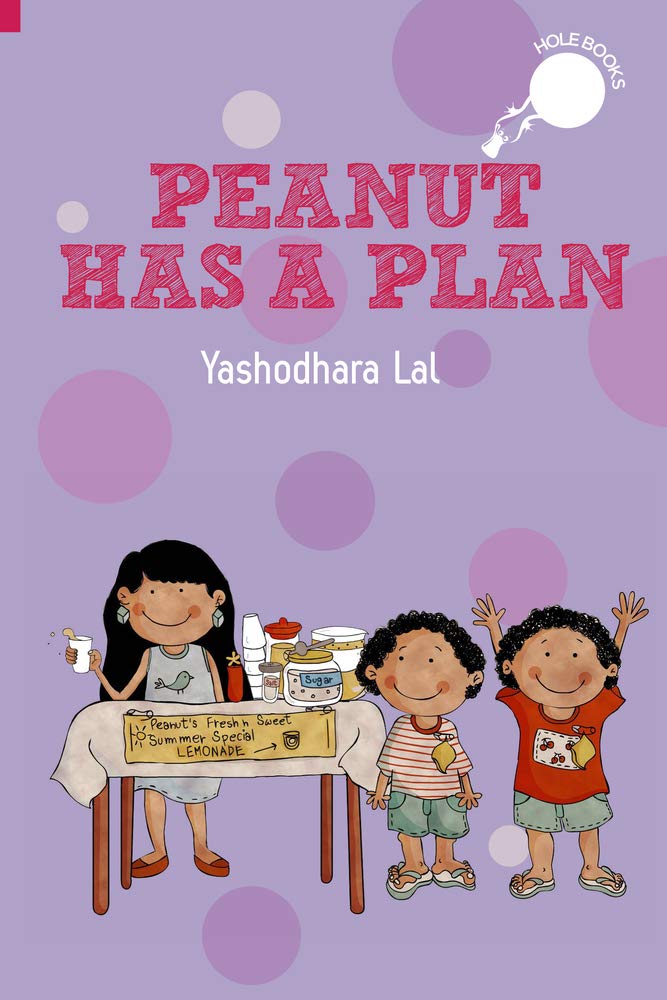
Names
Peanut, Papad and Pickle – I sure hope their parents named them after things they like! What if your parents named you after their favourite food? What would your name be?
As Peanut Has a Plan is the first book we will be reading at my book club next month, it’s a great way to introduce ourselves – tell us what you’re called, and tell us what you could have been called.
Summer Holidays
For Show and Tell in school, Peanut must talk about something new she did in the summer holidays. This is perfect for my book clubbers too! What did you do that you’ve never done before? What can you show us as you tell us your story?
Business Plans
I love stories about children’s money-making plans. Making Millions, Amelia Bedelia Means Business, Trunk Call for Ajju … How would you try to make money? Apart from the ideas in the book, what could you do to earn something?
Join my book club!
Registrations are now closed for the August-September 2024 edition of my book club. New batches begin every alternate month. Join my mailing list if you would like to receive email notifications about my programmes. Alternatively, follow me on social media – Facebook and Instagram – for regular updates.

The ABCs of Blogging
June 18, 2024
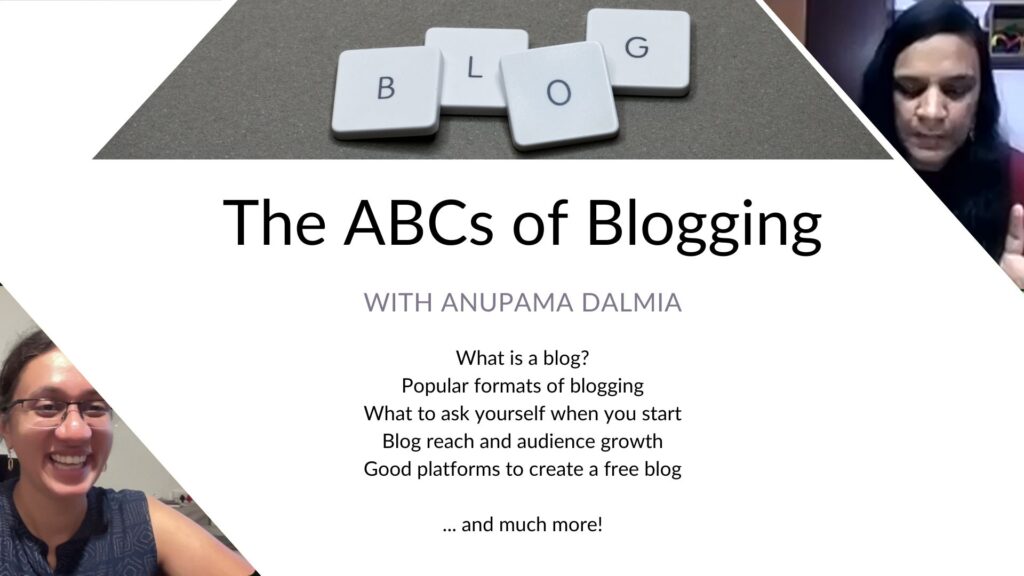
What an informative session we had with Anupama Dalmia!
Anupama began by discussing what blogging is. From there, we went on to so much more – blog formats (including vlogs and micro-blogs), finding your niche, and starting your own free blog. She then introduced the children to SEO and the backend, showing them how easy it is to start the process of blogging.
Importantly, she answered the question of why blogging could be a good idea – to build a discipline around writing. Once we start blogging, there is often a sense of accountability, the idea that writing and posting content is something that we need to do regularly and systematically. Where do we begin? How do we get noticed? What can we do to increase the reach of our blog posts? Anupama discussed all this and more in a single hour!
When guest speakers repeat something I keep saying in class, I’m always happy. For instance, I often ask children what the purpose of their piece is. What do they want the reader to feel? What are they trying to do with their writing? Anupama phrased it as WIIFM – what’s in it for me? As the audience, this is the question we ask. Why should I read your blog? It’s important to be able to answer that!
With this workshop on blogging (guest session #24!), we’re now drawing to the end of another writing programme. In October, the twentieth batch of my online writing programme will begin!
Character Design with Priyankar Gupta
May 19, 2024
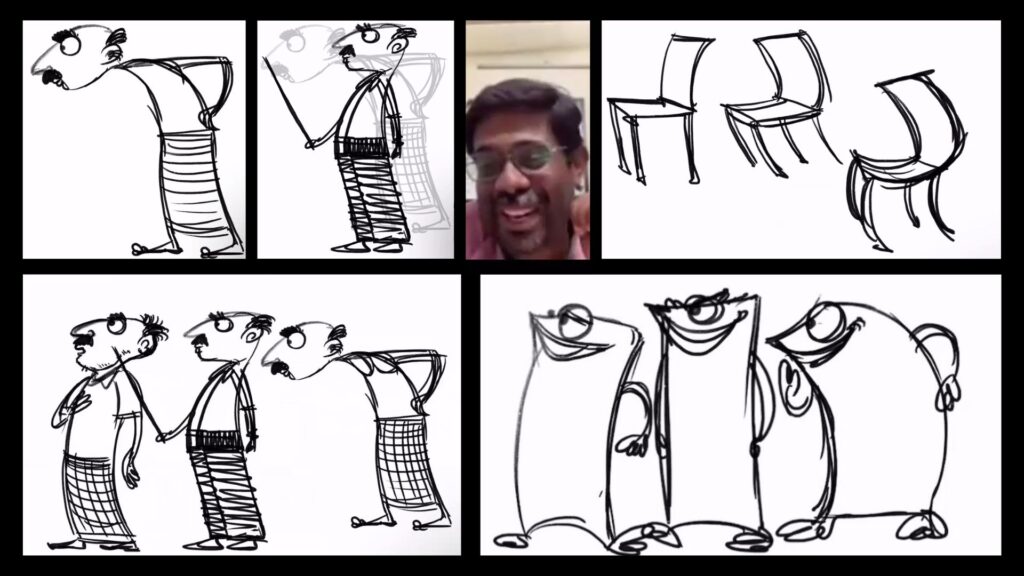
Practice. What a difference practice makes! Right through yesterday’s guest session on character design, I marvelled at how swiftly Priyankar Gupta created his characters. Talking all the time, explaining what he was doing, he was able to draw not one, but six full forms in fifteen minutes!
Characters, both human and non-human, are led by three parts of the body – the chest, the nose and the pelvis.
An inquisitive person tends to hunch. The whole body structure is led by the nose.
A confident person is led by the chest. This is why people in the army, or even dancers, tend to have accentuated chests.
All of us also have an aspect of us that is lazy, one that likes to sit and watch the world go by. This sort of character is led by the pelvis.
Once Priyankar had shared a few sample drawings, he asked us to draw characters of our own. Soon, the children shared sketches of chickens and grandmothers, pencils and teachers. And as the participants shared their work, we discussed the breaking of archetypes in subtle and not so subtle ways.
Priyankar ended the session with a quote from Neil Gaiman – make good art. No matter how you feel, draw. If you’re happy, angry, bored, annoyed … draw. For someone who’s barely drawn anything for years, it was an important reminder.
Draw. That’s it.
Ottoline at Sea
May 11, 2024
As far as possible, I try to source books from independent bookstores for my book clubs. And so, when Eureka Books informed me that Ottoline Goes to School was out of stock with the publisher, I decided to read Ottoline at Sea with the June edition of my book club instead! It feels like a win-win for me because I’m reading one Ottoline book with my May batch and another with my June batch!
Ottoline at Sea is another delightful book featuring the intrepid Ottoline and her friend Mr Munroe. Just like the others in the series, it is a perfect mixture of serious and hilarious because of the seriousness with which it addresses impossibility. I know that humour of this kind is not every child’s cup of tea, but the illustrations are sure to delight them all, even those who aren’t drawn into the story!
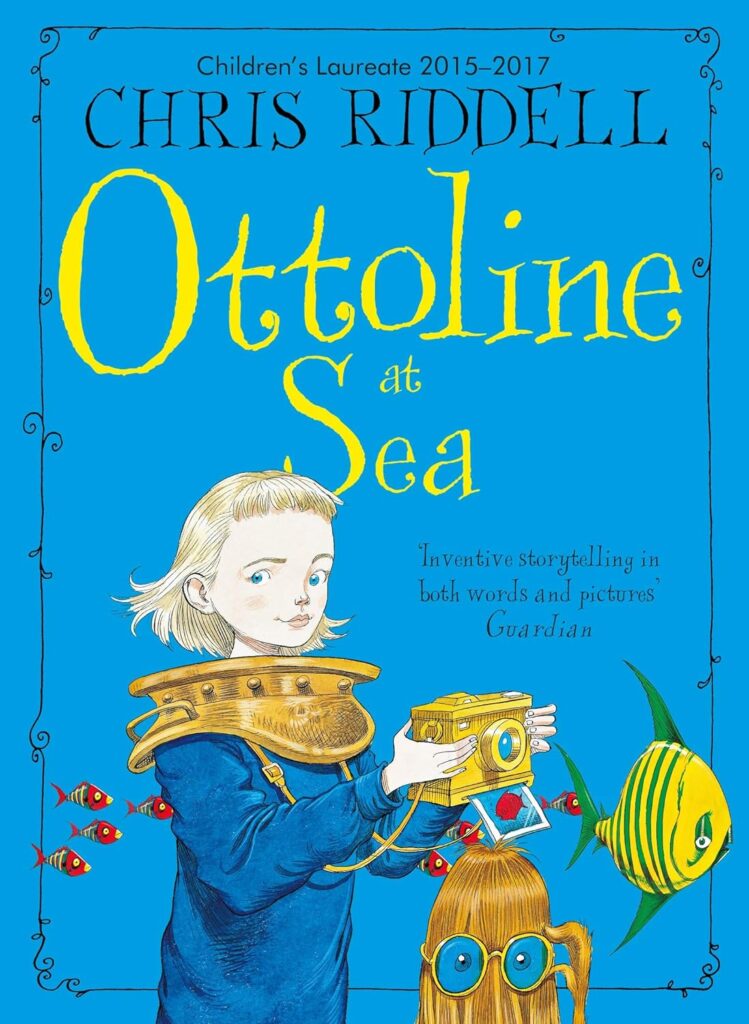
Collections
Just like when we read Ottoline and the Yellow Cat, we’ll talk about things we collect. Ottoline’s parents are “roving collectors”, and Ottoline herself has a postcard collection and a collection of odd shoes. What do you collect? I’d love to know, and I’d love to take a look!
Travel Journal
Children learn to express themselves through writing at different ages, but a travel journal does not require you to write much! Ottoline is wondering where to go on holiday and she doesn’t notice that Mr Munroe keeps giving her hints about wanting to go to Norway. When he disappears, she sets off for Norway – and this will be our prompt for a travel journal of our own. Through illustrations and words, I will ask the children to create a travel journal based on anyplace they’ve visited on holiday.
Design a Vehicle
Ottoline and Mr Munroe travel in unusual ways! Similar to the cars we designed as we read By Royal Appointment, we will design vehicles that could fly, dive, and perhaps even teleport! I can’t wait to see what the children come up with.
Join my book club!
Registrations are closed for this edition of my book club. New batches begin every alternate month. Join my mailing list if you would like to receive email notifications about my programmes. Alternatively, follow me on social media – Facebook and Instagram – for regular updates.
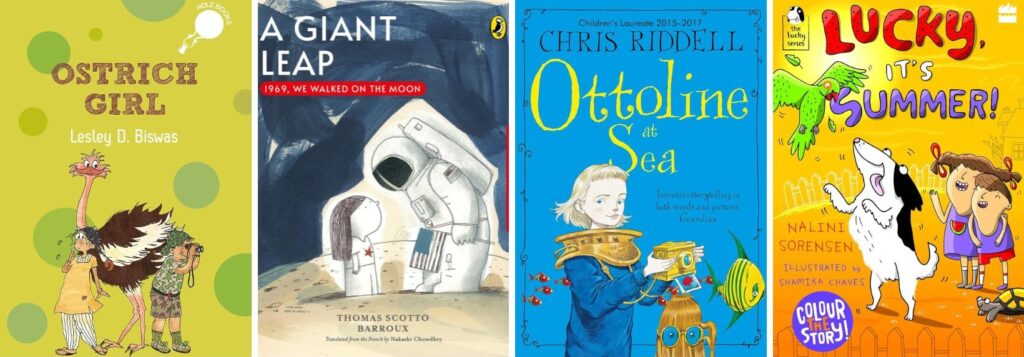
Reading and Writing Activities
May 8, 2024
I find so many resources on the internet that every so often, I try to return the favour by sharing a little in terms of resources and activities that have worked for me in class. Often, prepping for a lesson can be quite overwhelming, especially if you’re like me and like to have something planned for every minute of your lesson, plus a few extra activities just in case! In no particular order, here are a few things that have worked for me at my book clubs and writing workshops in the last few months.
Free Verse
I love teaching free verse! I’ve used all kinds of mentor texts in the past, including “Hope is the thing with feathers” by Emily Dickinson, which isn’t in free verse at all, but still works, as you can see below.
Both these poems are in issue 1 of WORDS, the e-magazine we create at my writing programme!
However, since I have children signing up for my writing programmes time and time again (Samanvitha is in my current batch too, for instance), I cannot reuse the same mentor texts and activities. And that is why stumbling upon a gem like In the Land of Milk and Honey was perfect!
We used this picture book in free verse to write poems of our own about places we know well. The text is perfect to explore imagery of all kinds, visual and non-visual. Additionally, the way in which Joyce Carol Thomas uses literary devices like metaphors, similes and personification makes In the Land of Milk and Honey a brilliant text to use in class!
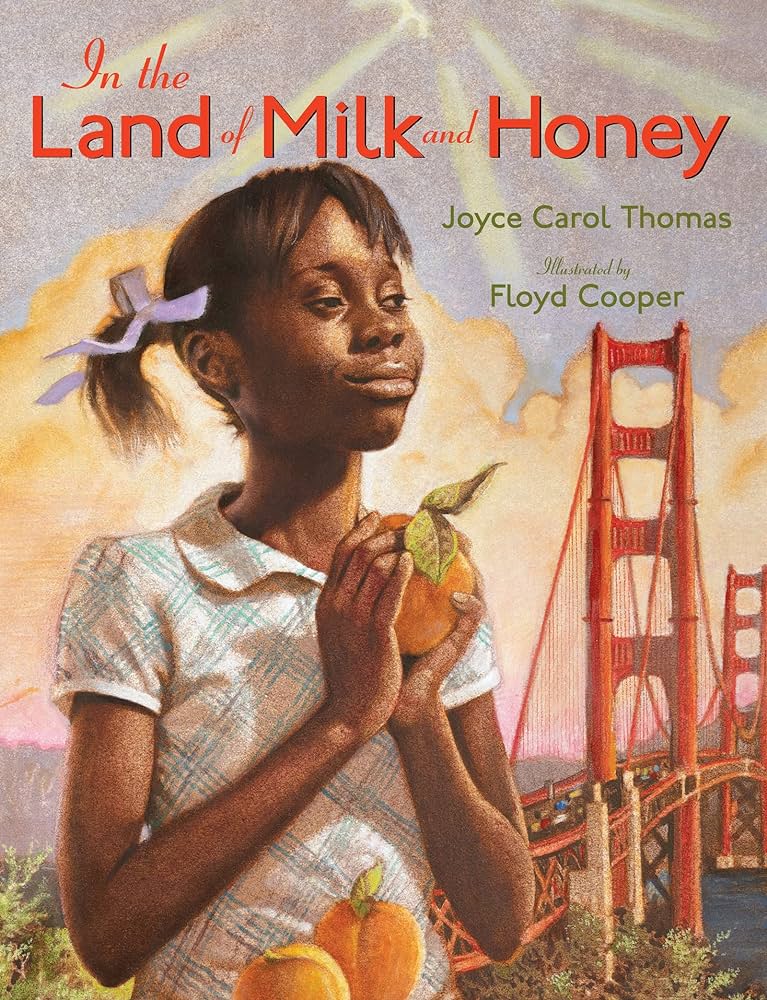
World Book Day Celebrations
I had three online sessions on World Book Day this year, and we did three different things with three different age groups!
With the youngest ones – ages seven and eight – we did a book scavenger hunt. This is always fun, but I’ve learnt through experience that I must give the children some time at the end of the hunt, before I continue with class, to put books back where they belong!
With the older ones, we did two versions of recreating a book cover. For ages nine and ten, we played with virtual backgrounds and imitated book covers. For the older ones, we tried to complete book covers by putting a book that has half a face in front of our own face. It was all fun!
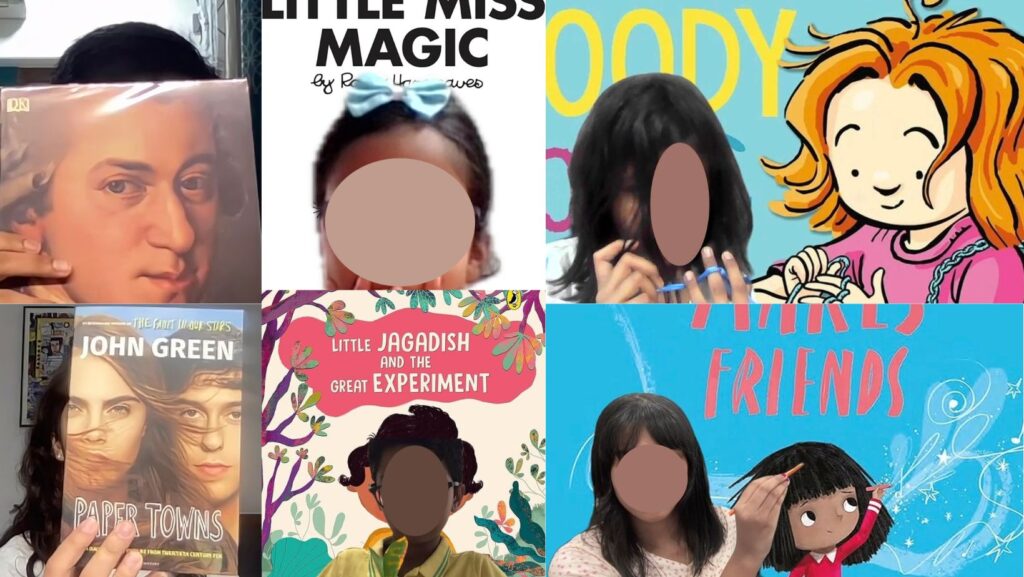
Fact Versus Opinion
When I teach nonfiction, we work a lot with fact and opinion. Often, opinions are more interesting than facts! Also, in the age of the internet, when you are sharing information about something that everyone has already heard of, what are you doing that is new? I can find out about monuments and birds by searching online. I’m interested to know what you think or feel about a topic!
And that is why when we read The Misadventures of a Lightning Thief, I asked the children to tell me about famous monuments, but more–about why they enjoyed visiting these places.

All the above images are via Wikimedia Commons
CC BY 3.0 <https://creativecommons.org/licenses/by/3.0>: Big Ben – Diliff; Chariot of Hampi – Apadegal; Gol Gumbaz – Meesanjay
CC BY-SA 4.0 <https://creativecommons.org/licenses/by-sa/4.0>: Qutb Minar – Sfu; Amer Fort – A.Savin; Pancha Rathas – Vinayaraj; Gateway of India – SriSriChinmaya; Rani ki vav – Rupeshsarkar
This was a great activity, especially as we linked it to a creative writing exercise once we’d finished reading the book!
There’s so much more that has worked for me in the past, and I hope to continue sharing ideas and resources. In the meantime, if you’re looking for more activities, take a look at my extensive bookish activities. Although they’re book-specific, a lot of activities can be paired with other books too! Also, taking a look at the Resources category on my blog could help. Here’s one last image to end my post – a tower of books that I’ve read at my book club so far!
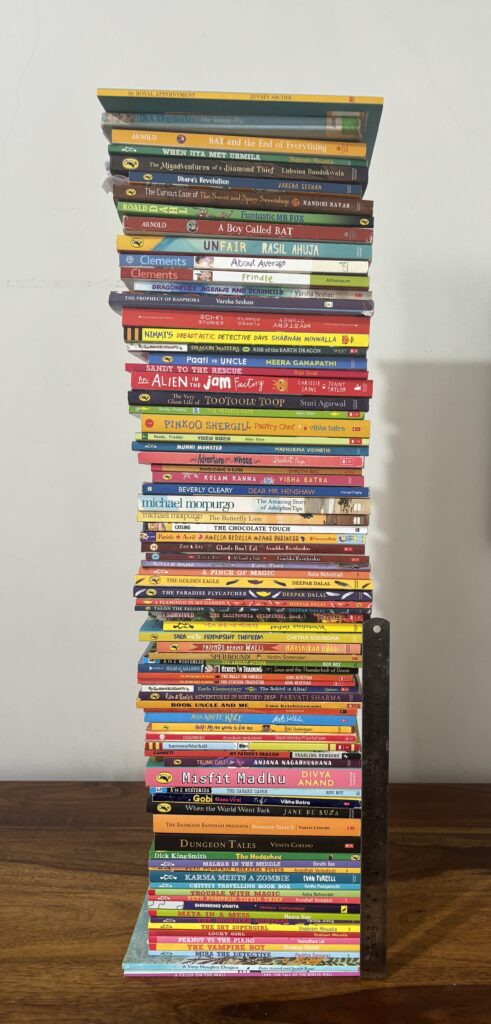
Lucky, It’s Summer!
May 7, 2024
A story told from the point of view of a Cocker Spaniel–what’s not to love about it? As a book club read, Lucky, It’s Summer! is perfect in so many ways. The lightheartedness of the story, the repetition, the in-built activities–everything about this book by Nalini Sorensen and Shamika Chaves promises to be fun! Besides, for many children who are part of my book club, it will be the summer holidays as we read the book, so what better time to enjoy it together?

Speech Bubbles
I often work with role-play at my book clubs and while some children instinctively understand how punctuation works for dialogue, others don’t. An activity where children have to write what characters say in little speech bubbles is perfect for this. What exactly does each character say? Can we put the words into the appropriate speech bubbles?
Point of View
Lucky has never seen a tortoise before, and she describes Sabby in a very interesting way! Thanks to the cover, we know what animal Sabby is, but what if we encounter a new animal altogether? Perhaps I’ll show the children pictures of a tapir, an axolotl, a pink-fairy armadillo and more, and ask them to describe what they see!
Favourite Animals
I love talking to children about their favourite animals. I’ve encountered all kinds of favourites, from pangolins to rabbits, elephants to dolphins. I’m looking forward to listening to children do this again!
Join my book club!
Registrations are closed for this edition of my book club. New batches begin every alternate month. Join my mailing list if you would like to receive email notifications about my programmes. Alternatively, follow me on social media – Facebook and Instagram – for regular updates.

The Golden Eagle
May 6, 2024
Krishna Bala Shenoi’s artwork is stunning. From the black-headed stork to the green pigeon, the pelican to the doves – the illustrations leap off the pages making The Golden Eagle a visual treat.
But of course, I choose books based on the story, not just the pictures, and The Golden Eagle is a pacy, exciting read.
The white-headed squirrel Shikar has questions. Who were his parents? How did he make friends with the birds? Why did Kabul the bulbul become a mother-figure to him, and why are Lovey and Dovey like his aunt and uncle? The two doves, Lovey and Dovey, set out to tell him his story. It’s a long story, full of twists and turns, a story about Regal the golden eagle.
I loved The Golden Eagle. Suspense, drama and beautiful characters make it a pacy read, sucking us into a book that full of politics, intrigue and betrayal.
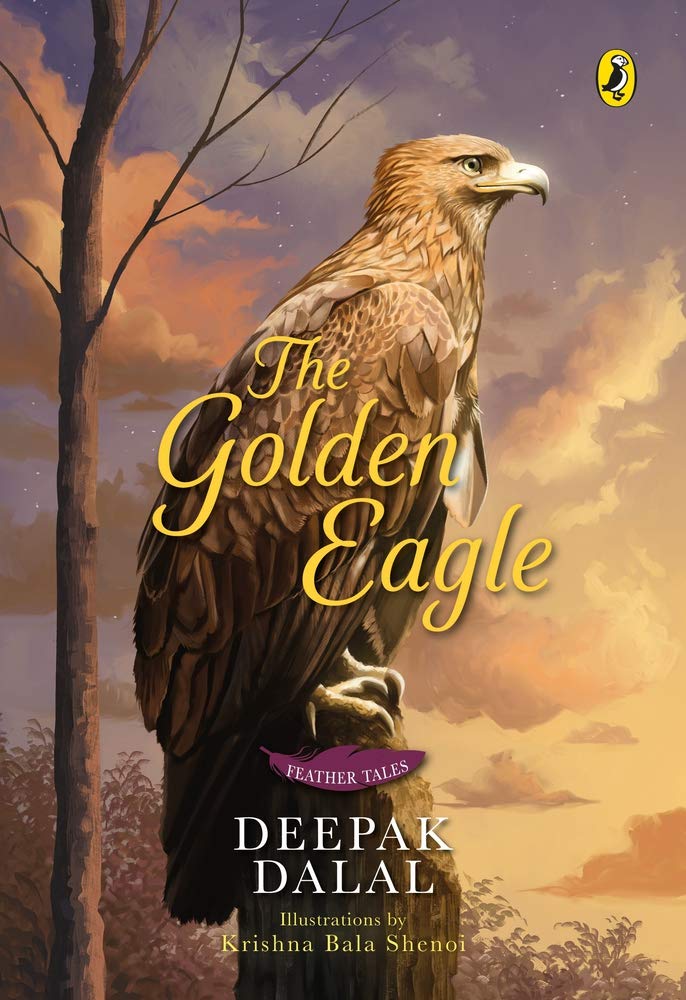
Suspense Writing
Writers can be plotters or pantsers, and I’m very much a pantser when it comes to my first draft. I like to see where the story takes me before going back to rewrite it to add foreshadowing and clues for the reader. And yes, that’s the crux of it – if you don’t plot your story, you need to go back and rewrite it.
With The Golden Eagle, I’d love to discuss what the readers are led to believe. What clues does the author give us? What do we feel about the characters? Is Mike the shrike suspicious? How about Chorus the thrush? And Teen the green pigeon? Pecan the pelican?
In a book with so many powerful characters, a discussion of this sort can lead to a wonderful activity on creating suspense in stories of our own!
Anthropomorphism
What makes anthropomorphism believable or not? Unlike in The Paradise Flycatcher, the human Mitalee has no role to play in The Golden Eagle. The whole story is about the birds. Does this make the tale more or less believable?
Animal stories were a childhood favourite of mine and I believe that children are drawn to animal stories because there’s magic in the relationships between animals and humans. Let’s see how we can create animal stories of our own!
Playing with Words
I love the number of bird idioms Deepak Dalal uses through the book! ‘Free as a bird’ forms the core of The Golden Eagle, but there’s so much more. Regal watches the bird kingdom with eagle eye. The doves eat like birds; they’re mocked for being bird-brained; some birds wing it because they don’t know what lies ahead. We’ll do activities around these phrases and see whether we can do written exercises that explore idioms based on a subject. I’m sure it’ll be fun!
Join a programme!
Registrations are closed for this edition of Read, Write, Explore. New batches begin every alternate month. Join my mailing list if you would like to receive email notifications about my programmes. Alternatively, follow me on social media – Facebook and Instagram – for regular updates.
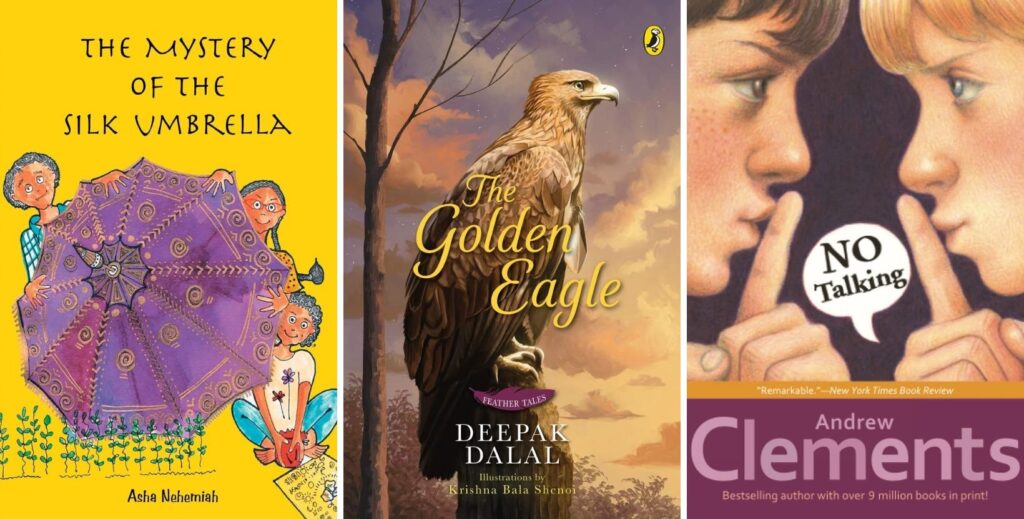
We’ve read The Golden Eagle before at my book club–three years ago! I wrote about it too; take a look!
We’ve also read all the others in the Feather Tales series:
Ottoline Goes to School
May 5, 2024
We read Ottoline and the Yellow Cat at my book club last year, and it was such fun. I enjoy silliness of this kind so much that the book was on my list of favourite chapter books from 2023.
And Ottoline Goes to School, which I read in 2022, was one of my favourites from that year. I’m waiting to read it with my book club!
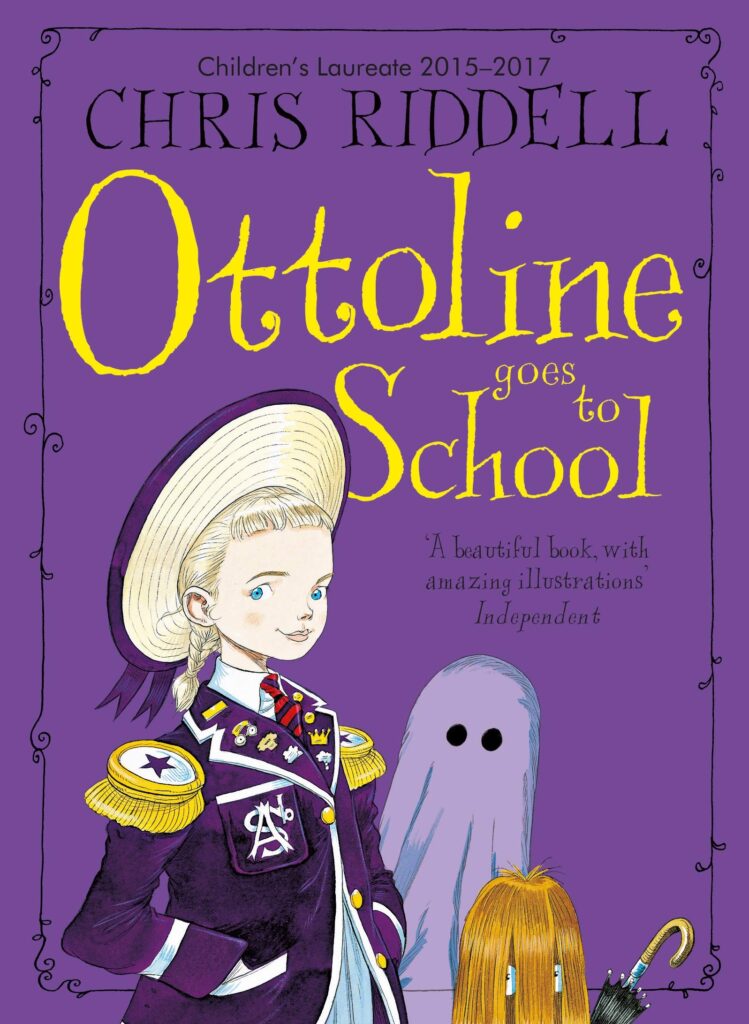
Picture Postcards
We’ve made picture postcards at my book club before and it is so much fun! I remember doing it when we read The Absolutely True Adventures of Daydreamer Dev. I sent my book clubbers postcards after that too, which was part of the fun.
Since there are so many letters and postcards in Ottoline Goes to School, we’ll make one of our own!
Unusual Subjects
At the Alice B. School for the Differently Gifted, there are some very unusual subjects, like Giggling Studies and Weeping Workshop. What other funny, impossible subjects would we like to study in school?
Taking this further, we’ll also look at the days of the week and rewrite it in an unusual way!
Different Gift
Right through Ottoline Goes to School, Ottoline can’t figure out what her unusual gift is! What gifts do we have? What do we think we’re good at, and what do we feel we could get better at with a little more practice? I’d love for the children to tell me and show me!
Join my book club!
Registrations are closed for this edition of my book club. The next edition will be held in June 2024. Join my mailing list if you would like to receive email notifications about my programmes. Alternatively, follow me on social media – Facebook and Instagram – for regular updates.
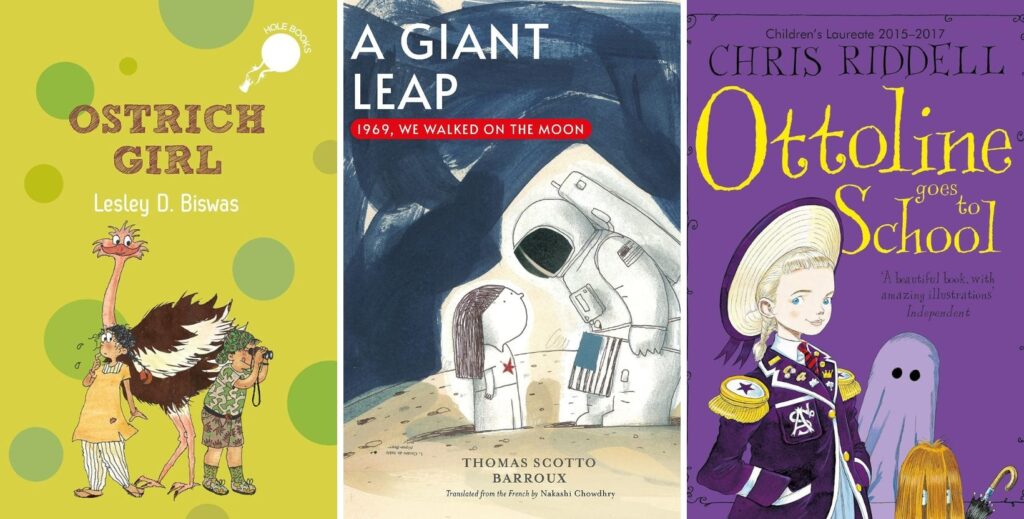
No Talking
May 4, 2024
No Talking is such a fun book! I’m often wary of ‘Boys vs. Girls’ stories because I don’t like books that reinforce stereotypes. No Talking does the opposite; in fact, rather too explicitly so, for me. Despite that, I thoroughly enjoyed the book. I loved how a contest between the boys and the girls in a class slowly morphs into a team game, where the students overcome their differences and come together. What emerges is a school story that is utterly believable and good fun!
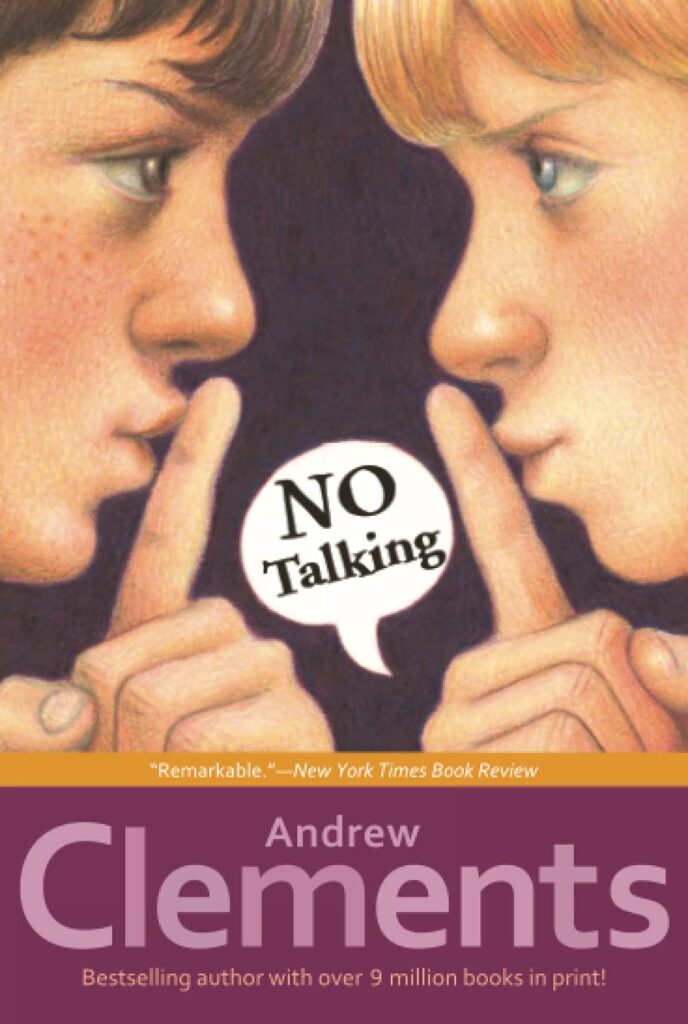
Three Words at a Time
I’ve lost count of the number of times I’ve played the one-word story and the one-phrase story. In No Talking, Mr Burton introduces the three-word story, and I love it! It’s perfect for my book club too. Can we create a story together, three words at a time? I’m sure we can!
Three Word Debate
Mr Burton takes the three-word challenge further with a debate: Should there be soft-drink machines in school cafeterias?
I’ve never worked on debating at my book club before, but I’m curious about giving it a shot! I can’t wait to see how it works!
Dialogue Writing
Writing is an important part of Read, Write, Explore, and the dialogue in No Talking sparkles – all the more so because it’s sparse and well thought-out. Once we’ve finished reading the book, we will try to write dialogue of our own, challenging ourselves to use as few words as possible in each speech.
Join a programme!
Registrations are closed for this edition of Read, Write, Explore. New batches begin every alternate month. Join my mailing list if you would like to receive email notifications about my programmes. Alternatively, follow me on social media – Facebook and Instagram – for regular updates.

I love Andrew Clements’s books! We’ve read:
I’m sure we’ll read more as the months go by!
A Giant Leap
May 3, 2024
I read and reviewed A Giant Leap three years ago. Since then, I’ve been thinking about introducing it to my book club, but it’s shorter than the books I usually select, making me wonder whether it would be too simple a read. Yet, so much draws me to the book, from the childlike perspective to the exploration of a landmark event, that I decided we would read together. Here’s what we’ll do with it!
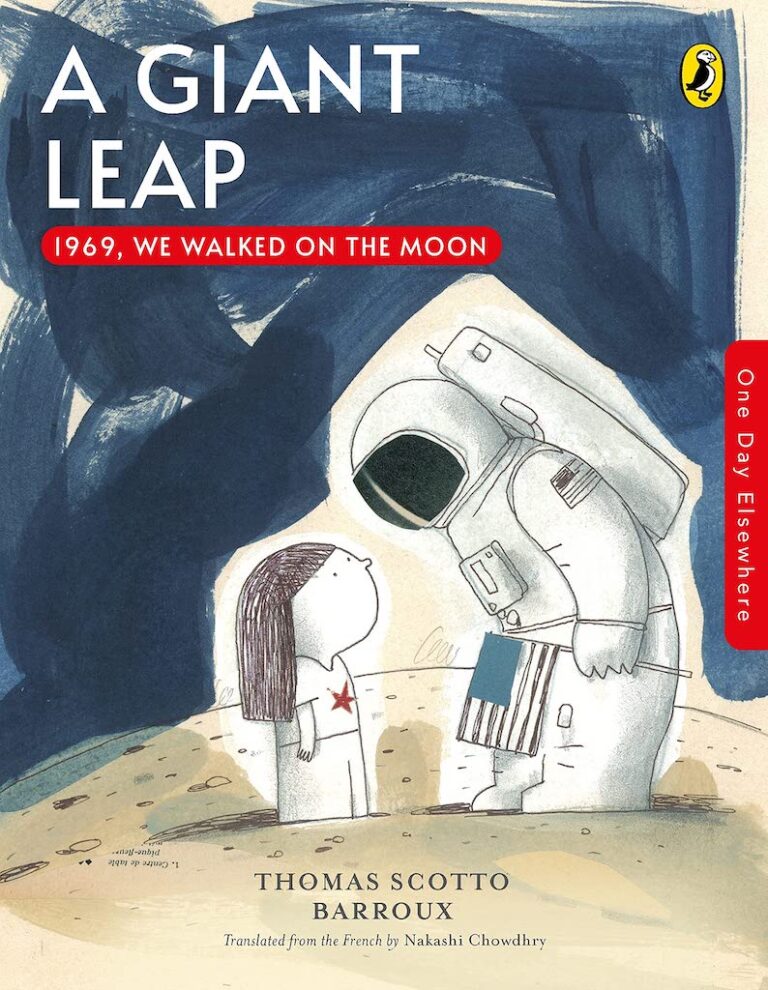
Gravity
I know that gravity as a concept is one that children study much later, but a lot of them have visited upside-down “museums”. What do they think will be most difficult to do in a place without gravity? What do they think will be most fun?
Moon Stories
There are so many more stories about the moon! Who is the man on the moon? Is there a rabbit on the moon? Does a monster eat the moon every month?
We’ll explore a couple of stories, where they come from, and then talk about things that we are still curious about – the mysteries at the end of the book.
Scrapbook
Journaling is fun! We explored it a little when we read Munni Monster some time ago, but we’ll play with it some more next month with another set of children. As we read, we’ll make one page of a scrapbook. Sketches, thoughts, ideas and feelings – everything has space in a scrapbook. Using visual aids, I’ll invite the children to write a poem or a paragraph about how they would feel if they were astronauts on the moon. Whom would they think of? What message would they send home?
Join my book club!
Registrations are closed for this edition of my book club. New batches begin every alternate month. Join my mailing list if you would like to receive email notifications about my programmes. Alternatively, follow me on social media – Facebook and Instagram – for regular updates.

The Mystery of the Silk Umbrella
May 2, 2024
The Mystery of the Silk Umbrella is the sixth book by Asha Nehemiah that we’ll be reading at my book club! And it promises to be just as much fun as the others.
Like any good mystery story, The Mystery of the Silk Umbrella keeps you reading. Who is the mysterious intruder at the beginning of the book? What could Shantha athai, who really has no valuables to speak of, be hiding that is so precious? Who wants what she has, and how does the silk umbrella fit into all this?
With so many chapters ending in cliff-hangers, the book compels you to read on, intriguing and humorous at the same time. Gutsy heroes, nefarious villains and a range of colourful side characters make this a fun read, which I’m looking forward to introducing to my book club!
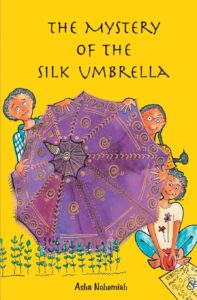
Precious Objects
The silk umbrella is special to T. Satyavan for secret reasons. There are memories associated with that umbrella, precious memories that are almost forgotten. This is the perfect time to explore objects that are precious to us for various reasons. I’d love for the children to tell me about precious toys or books, clothes or jewellery. What do they hold precious, and why?
Book Discussion
The Mystery of the Silk Umbrella is full of things we can discuss! What guesses do we make about the characters based on their names? Satyavan, RaVaNa, Kharabi Nastinovich … What other names can we come up with?
At the end of several chapters, we’re left wondering what will happen next. Based on the clues left by the author, what do we think could happen? How will the drama end?
Mystery Story
What are the elements of a mystery story? How can we keep the reader engaged?
As creative writing is an integral part of Read, Write, Explore, we will work on a series of writing exercises, investigating the ways in which writers create suspense and evoke curiosity. If time permits, we will also write a complete mystery story!
Let's read together!
Registrations are closed for this edition of Read, Write, Explore. New batches begin every alternate month. Join my mailing list if you would like to receive email notifications about my programmes. Alternatively, follow me on social media – Facebook and Instagram – for regular updates.

